#a lot of the doctor's character development arcs are all about how they treat their companions
Text
i will forever be fascinated with doctor who, i hope that never changes
#shut up danni#im in big dw brainrot mode because i am analysing everything abt the characters#its so interesting to see the way that character development happens in this show because it really does flow so naturally#and the parts where it doesn't you can really see that they twisted things for the plot#and/or its easy to tell that it was written by someone who didn't understand the characters well enough#every companion goes on a different character development and the doctor is usually a big influence on them#and its so clear to see how sometimes the doctor is a good influence and sometimes its a very bad one and sometimes its both#AND THEY ACKNOWLEDGE IT!!!!#a lot of the doctor's character development arcs are all about how they treat their companions#and it pushes them to change their behaviour and they grow#and it always feels so natural if a doctor starts out v grumpy and rude they'll slowly soften and their behaviour changes#i just--#im forever gonna love this show even in its low areas#and i hope that they'll continue to go in a direction that i like because i always get sad when they don't rip#anyways nearly done w season 8!!!#just two more seasons until i get back to my girl!!!!
3 notes
·
View notes
Note
hello i would love to hear your general thoughts re: tenmartha if you feel like sharing them
okay so many thoughts about dr. martha jones and the doctor but one of the main ones is that despite popular (misogynoir-driven) belief, martha's character as written is much stronger than people give the series credit for. i think so much of her very strong character development and arc (based in her growing into her self-sufficiency, which was always there from the start and demonstrated in her constant analysis and questioning in the search for the most info to make the right decisions) is overshadowed by fandom racism, too much focus given to the unrequited crush storyline (which is also key to her arc, but is also something that she very distinctly and importantly gets over!), and general "she's not rose" sentiment. i think it's really interesting that unlike rose or donna whose narrative arcs need them to become super-human, martha essentially becomes the doctor's equal by the end of her run, if not surpassing him given the fact that as a human, she doesn't have those same otherworldly powers as him.
while i think the narrative of season three ultimately lets her come out on top, i think there is a big cost to that, for both martha the character and for the viewers. even separate from fandom racism there are so many moments of racism in the series that i don't think actually do anything to further the storytelling (literally fuck the whole human nature/the family of blood storyline) and that puts a damper on much of that whole year for me despite loving the characters. i also understand why the doctor (via the writers) is constantly comparing martha to rose, but the moments where martha calls him out on it—while they are certainly there—aren't always enough. i think that fact that martha also begins as fairly dependent on the doctor's validation (which like. makes total sense, she has no idea how all this works and is getting thrown into insane scenarios with no info from the jump) gets reduced to calling the character "needy" which just simply isn't true. this is also something that i think people focus on a bit too much rather than seeing how that particular character trait shifts throughout her season.
all this to say, when tenmartha is good, it's fantastic. freema agyeman and david tennant's chemistry is so on point, and that saves a lot of otherwise mediocre-to-bad writing. from the jump martha is shown to be so SO fucking smart, self-reliant, willing to take risk, and uninterested in the doctor's bullshit; when the doctor isn't just whining in the post-rose hangover or treating her like crap, he recognizes how powerful she is AND how much potential she has to continue to hone her skills, which is why he trusts her so inherently and ends up leaning on her so much during that season. the fact that he manipulates her emotionally to me is equal parts hard to watch and based writing-wise in a lot of the aforementioned -isms AND interesting character development from him because we haven't really seen that type of messy fucked up (human) behavior from the doctor. and then martha leaves on her own terms, which no other companion has gotten to do (clara's storyline feels different in that regard to me). she realizes she doesn't need him, arguably becomes his equal (or surpasses him) in terms of skill, and makes it out alive. imho that's a pretty big accomplishment.
#sorry ben this turned into more of an essay than i meant but. i love martha so much!!!!!!!!!#also on the personal note it meant a lot as a kid to see a black companion and i just always liked her#doctor who#martha jones#ten#tenmartha#majorbaby
316 notes
·
View notes
Text
More Vision Magazine Stuff
So, I've looked a bit into the origin of all of Five's companions (except Kamelion, who hardly exists as a character) and tracked down early character descriptions for all of them.
Well, not quite for Adric. The Adric description was very short.

We get that he's supposed to be 15, so that's good to know. The thing with Adric is that it seemed like no two writers thought of him as the same character.
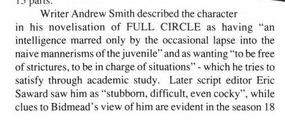
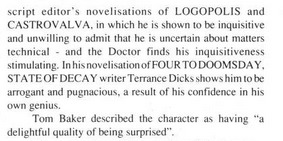
These takes don't entirely need to contradict one another, but it sounds like the writers were all given a kind of vague description and were never on the same page for what to do with it.
Andrew Smith: He's smart but also immature
Eric Saward: He's a brat
Christopher Bidmead: He's curious and the Doctor likes that about him.
Terrance Dicks: He's an arrogant know-it-all.
This also gives off the vibe that Bidmead liked Adric and Saward didn't, which might explain why Adric worked slightly better in season 18 than season 19. The script editor actually wanted the character to work.
I'd personally go for a mix of the Smith and Bidmead approaches. He's a genius, but his knowledge is still limited, something he's reluctant to admit. He can be a bit of a brat, because he's 15. He's literally immature. But, the Doctor sees his potential and admires his curiosity, so he acts as a sort of mentor figure.
Anyway, the character descriptions of other characters that were provided are a little more detailed, so the writers probably had some idea of what they were doing. Going in order of introduction, here's Nyssa:
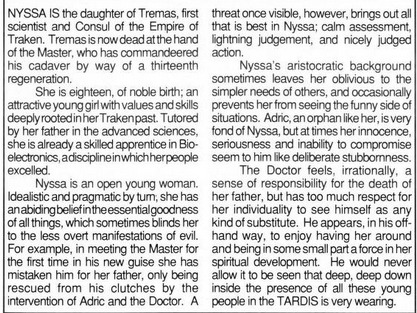
Look at how detailed that is! Here's another one whose age we know (18), as well as her backstory, beliefs, skills, and what both Adric and the Doctor think of her. Most of this stuff isn't really explored in the show, but Big Finish clearly took it and ran with it.
Next, Tegan:
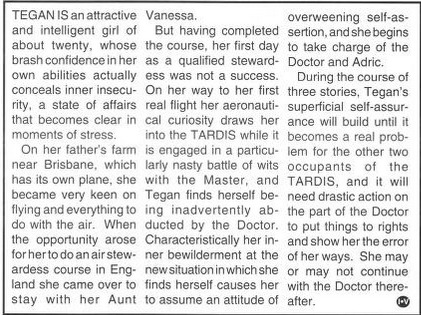
So, we get another detailed background, but while it seemed like everything with Nyssa was worked out, we're not confident about Tegan, not sure whether she's going to stick around or not. She starts with a one-off story arc that sounds kind of annoying, honestly. The girl is accidentally put in a Situation and she responds by taking charge of the Situation. But, she basically has to learn to leave things to the men. I doubt Janet Fielding was happy about this: Playing the "uppity" woman who learns to shut up and follow the patriarch. I don't think the people writing this really thought the implications of this arc through.
So, yeah, I was a bit harsh on that one. It's not too bad as an arc out of context, but considering problems with how Tegan was treated by the writers (and the fandom tbh) later, it doesn't bode well.
Anyway, here's (me obsessing over) Turlough:
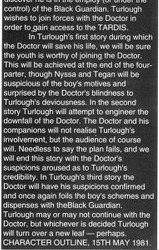
So, Turlough is 20, around the same age as Tegan, which is what I assumed but this does confuse people. I still think it's funny that he's described as blond, they cast a blond actor, and then had him dye his hair red.
You'll notice from the May, 1981 date, that this was early in development and a lot changed between this and what he see onscreen. Turlough's initial arc was written without reference to the stories it occurs in and his introduction doesn't make any sense with the backstory he was eventually given. They meet him on a planet he's lived on for as long as he can remember.
They basically wrote Turlough's arc before the stories of Season 20. He was apparently going to be introduced in a story called The Song of the Space Whale, where he would just be a person on a planet. But, the story fell through and they decided to introduce him in another story, Mawdryn Undead, instead.

The fact that Turlough was in exile was made up to explain him being at Brendon. Apparently just so the story would make sense to the person writing it. You can tell just how much they were making up as the went along.
Lastly, we've got Peri:
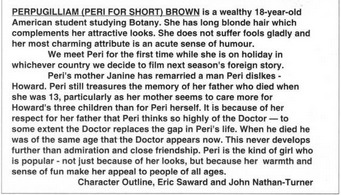
Long blonde hair is basically the opposite of Peri's hair, so this was clearly written well before the role was cast. Also they didn't even know where they were filming "next season's foreign story". It really was just "The Vacation Episode" at this point.
Also, Peri's family life is given a lot of backstory that never comes up onscreen. The description of her dynamic with the Doctor is amusing:
"The Doctor reminds Peri of her dead dad. They remain platonic friends really." As if "surrogate father" would immediately be equated to "potential love interest" because Peri's hot. Peri has daddy issues. Saward and JNT had daddy issues issues.
Also, they clearly had no plans for the Sixth Doctor here. Once again, they made shit up as they went along and hoped it would all work out in the end.
#adric of alzarius#nyssa of traken#tegan jovanka#vislor turlough#peri brown#80s doctor who was a bts trainwreck#at least it's funny
41 notes
·
View notes
Note
Meh silly question here but if you go to shig tag here what you will see is:
Shiga x ships
Shiga is an incel / is crusty
Shiga loves dogs
Ignore the first two, let's focus on the last one. The main joke the fandom treats as canon is how shig is a dog person. Cool.
Have you noticed how ...we never saw any corgi after Monchan? Technically, this isn't a big deal for the story...but you think Shig "I love dogs, especially corgis" this could have been.
Imagine shig wanting to destroy UA and...us has a corgi as mascot. Does he still attacks?
Imagine Izu having a corgi himself (fr I think BK would try to kill it) how shig would react?
Yes, we do have the gag on the manga where "I want to revive Monchan" but never follows up.
He never consider how the dogs would be affected in his "destroy all" plan. Yes, granted a person valuing a dog's life over millions is still wrong but you know, shig thinks about no one.
So ...the whole fanon "shig loves dog" is another inconsistency for his character.
Hi @mikeellee 👋
Realistically speaking you can argue that almost everything in shigarakis character is a bit inconsistent.
I think it would be quite interesting if shigaraki did indeed value a dogs life a lot more than a humans but it's simply a gag that the fandom has so they can further humanise and even relate to Shigaraki.
The only time we see shigaraki interact with an animal is with monchan so I wouldn't label shigaraki to be the number one dog lover at all because in canon there really isn't any content pointing to it.
When does shigaraki make a comment that he wants to bring mon Chan back? I honestly don't remember.
Shigaraki's plan is to destroy and destroy he will I don't think he would care if UA's mascot was a dog or if izuku had a pet dog maybe in the earlier arcs he would talk to izuku about it.
Ultimately shigaraki deserves better characterisation and consistent one at that. We deserve shigaraki to get a proper goal that develops from just destroying to something like taking down hero society and making a point. We deserve to see shigaraki actually utilise the MVA resources. We deserve to see shigaraki grow into the leadership role and become a proper head of the lov while developing his relationship with the leauge and izuku. We deserve shigaraki getting revenge and killing AFO and hurting the doctor. We deserve to see scenes with kurogiri being a father figure to shigaraki. We need more but dam hori fumbled the bag so badly

#mha critical#bnha critical#mha#horikoshi critical#hori is a bad writer#bhna critical#bnha#shigaraki deserves better#gotta love the lack of anything consistent when it comes to shigaraki#thanks for the ask#thanks for the ask!
10 notes
·
View notes
Note
ngl as an mha villain stan i sometimes wonder if hori’s pretty transparent goal of social reform in the manga is mainly because of his bias for the lov. i don’t like how he treats outside villains as if they’re less deserving of sympathy to the readers. it’ll leave the ending feeling a little idk the word fake? at least to those who pay attention to this part of the story.

sorryyyyyyyy
anyways with the latest chapters released after this ask in mind. and also just the direction the entire final arc has been going. firstly, i don't really think there's a transparent goal of social reform, so much as it's something that's constantly dangling in the corner of the narrative's peripheral. the story brings up the structural issues that has led to a lot of villains, but also hmms and haws over how much of those are REAL issues / all for one's fault / just people not being strong enough to get over it.
the story is certainly stronger and more cohesive when you read it through the lens of structural issues and social reform! they are a part of the narrative! it's also scared to commit to those ideas, because it's being published in Weekly Shonen Jump with a brutal workload that an author who seems to at best have a very centrist view of the world must suffer through.
based on 424, i think in epilogue we're going to get lip service to those social reform ideas. shouji will be that light shining on heteromorph discrimination, maybe something will happen with quirk counseling. while the status quo is something that the character's have honestly been angling for (STREAM BRING IT ALL BACK A TONE POEM ON RETURNING TO THE STATUS QUO), there's enough in 424 to say that like. well you got the very on-the-nose juxtaposition between the building crews and the doctor's news - you can work towards bringing things back to normal, but they can't. the memory of shigaraki telling deku that if anything has been destroyed depends on what people decide to do tomorrow, the whole "we've got to go further beyond". like, the obvious hints are that the kids are going to do more.
it's just not going to land because not once have any of these kids have actually engaged with those ideas. shouji never intended to actively change anything about discrimination, he just wants to be a passive icon. uraraka did a great job actually engaging with toga and understanding her point of view, but quirk counselling didn't really come up and it's never been a part of her storyline before. the todoroki family has had the most direct engagement with the ideas of abuse, but there's a veil of it being an "in the family" issue like. deku doesn't think about fuck all.
but back to your actual point about the LOV and horikoshi being biased towards them. like True they are the villains with the most backstory and pathos, most panel time, attention, development, so on and so forth that a lot of other villains don't really get, to my despair (MORE MLA. MORE SHIE HASSAIKA. MORE KUNEIDA AND GASHLY).
but those other villains, that don't get the same sympathy by the narrative, are also way less brutalized than the league is lmao. they can just go to jail, which is apparently too awesome for the league to end up in so they gotta die, as a mercy, or whatever people are arguing nowadays. it be what it be! maybe it's like how everyone likes to put their favourite characters through hell.
3 notes
·
View notes
Text
My gal Twice literally developed a split personality that he couldn’t control for years. Brainwashing like that done in cults isn’t the same as media you know where a person has zero control over their actions. The manga spelled out way back in the My Villain Academia saga that Toga experienced extreme child quick “therapy” that was meant to mentally suppress the urges her quirk gave her. The mask imagery in those scenes existed to show the extreme mental pressure that put her under it wasn’t a simple talking session with a counselor. She was biting her hands drinking blood from her wounds in her sleep the experience did not leave her mentally stable.
Also you are literally the only one saying the LOV can’t be called out or aren’t responsible so don’t argue that when that isn’t the point at all. Maybe you interact with people that are giving you guilt free stuff but that was never the point of the manga or what we were talking about so stay on point.
If you feel people are saying you don’t understand trauma it is because your rants suggest that. You act and write in a way that is only black or white. Either the characters have full empathy and agency and choose evil or they have none and can’t control themselves. If you understood trauma you would know it can be a mix of both where you lack full control but are still responsible for the consequences of your actions. You say you understand but you don’t behave or argue in a way that in any manner really suggests you do beyond buzzwords.
You say “But I obviously do.” Where? Nothing you have said suggests you do. Everything you write is either fighting about arguments some unnamed people made or saying you guys as if the people that talk to you and point out issues with your posts are a hive mind that all believe these extreme points. If you think I want the LOV to skip away after the fight like nothing happened you are the one who doesn’t understand anything because you have made up something in your mind and are getting upset about that over there far away from the truth.
I mean You say you hope characters die and then act surprised when people thing you don’t want those characters heal. Shocking. It is as if you have no concept of others outside of you. Argue about guilt free cards when someone actually says such a thing and I mean actually says that says that not says something that you think means that. Don’t fight the battles you have with other people with anyone besides them.
Also maybe you may disagree but the key thesis of MHA is a true hero fights to save everyone. Just like a doctor fights to help all their patients or a firefighter fights to rescue everyone from a fire. If Ochako wants to make her profession you know her actual job hero work the story is saying she must first do everything she can even put her life on the line to save people and she can’t turn away who she saves. Same as how a firefighter must put their lives on the line and enter burning buildings where they could die to rescue people no matter who they are even terrible people. Same as how a doctor must treat everyone even murders and horrible people. Sorry but de-escalation isn’t easy. The reality of it is that you have to make yourself vulnerable to people some horrid that can hurt you. The story has always been about the idea that to defeat a villain it isn’t enough to just hit it society does need to listen to and address the issues that caused various problems and work to fix them while holding villains accountable. And for that message to work you have to do it for extreme characters just like a redemption arc doesn’t work unless the character has done something extremely bad.
Maybe we can agree that this is a lot for anyone and why again the society in MHA is flawed because it is traumatizing and using teenagers to fight these battles because the adults failed to protect the children or to address these issues. But the story is meant to take extreme issues and show kids that even if the world is messed up right now and they have to fix problems adults failed to address or worse contributed to that hope isn’t lost and they can do it by working together.
Its a modern fairytale where instead of children being forced to go fight giants and monsters they are being asked to empathize with people who hurt them instead of just calling them evil and killing them. Both stories when taken to extremes are bad but both teach valuable lessons the first bravery and the second empathy and both resilience, teamwork and courage.
This is just as obnoxiously condescending and ignorant as your previous message that I was tempted to just delete it. But I’m in a mood to rant and vent, so I will.
Talking to people like you is so frustrating because you swear you’re not excusing the villains and you claim you’re holding them accountable and yet you jump through hoops to declare the villains as too traumatized to know right from wrong and thus give them a guilt free card. Maybe work on this of lack self-awareness before barging to a stranger’s inbox to be as obnoxious as possible.
I don’t have the time or the energy or the desire to go through my whole blog just to give you specific examples of me supporting the idea of giving the villains a chance for redemption and healing. I’ve talked about it many, many times. Look for it if you care. But don’t talk out of your ass and assume how my mind works. Just because I no longer feel sympathy for the villains and wouldn’t care if they dropped dead doesn’t mean I don’t logically support the idea of their healing and atoning.
I am so beyond sick and tired of this narrative that claims anyone who dares criticize Hori’s writing (when it comes to the heroes’ responsibility to the villains) is an ignoramus who doesn’t get the story’s themes. I get the themes. Empathy is nice and mercy is cool. I fucking get it. I just think they’re terribly written.
Your comparison between heroes and doctors/firefighters is disingenuous because when doctors/firefighters say “we need to save everyone” they’re working against the elements of nature (diseases/fire), not against the people they’re trying to save. Your comparison would work if you compared the heroes with cops or the military or forensic psychologists or any job that forces people to help or deescalate the violence of criminals who insist on causing destruction and assaulting others. And guess what? None of them think all criminals can be saved. None of them think it’s possible to save someone who doesn’t want to self-reflect and take responsibility. None of them prioritize “saving” the criminals above protecting innocent people. None of them think deescalating means putting their literal lives in jeopardy.
And Hori is not even consistent with his "save everyone" because he showed us Deku giving up on some villains! Why are the league of the villains the only ones given endless chances while the other villains were tossed away after one chance and sometimes without being given any chance???
Other writers of Shonen manga nailed the “save the villains” plot because they leaned heavily on the unrealistic/fantastical presentation of their themes and characters’ psychologies, while Hori was fairly realistic. And they made sure that the heroes would not dehumanize themselves to be empathic and compassionate, and they would mostly let the “talk-no-jetsu” therapy for after the fight was over and the villains’ asses were kicked. And most importantly: they didn’t make every single hero - even teenagers! - feel morally obligated to give that “talk-no-jetsu” in the first place. That’s why their “save the villains” story worked and Hori’s didn’t.
One of Hori’s biggest problems is making the heroes feel morally obligated to be the villains’ therapists! during times of war! while the villains are trying to literally murder them! That is a ridiculous demand because BNHA is not a fucking fairytale. If it was, then serious RL issues like child abuse and redemption would be dealt be symbolically and not realistically. If BNHA was a symbolic fantasy then I wouldn’t care if serious RL issues (like terrorism, stalking, physical assault, attempted murder, and adultification) were used in an abstract way to explore other RL issues (empathy, mercy, acceptance, child abuse, isolation, despair). Like I said in the previous ask: You can’t argue for hyper-realism when talking about the villains’ trauma/moral responsibility but argue for utterly unrealistic fantasy bullshit when talking about the heroes’ trauma/moral responsibility (just give the traumatized terrorists empathy and mercy and they will stop being evil!). You can’t have your cake and eat it too.
6 notes
·
View notes
Text
oh wow. so the christmas special was a lot of fun! my main thoughts..
Ruby feels like a mashup of rose and clara with a dash of amy— idk if that was intentional, and it’s not necessarily a bad thing bc i think anyone who likes Ruby and hasn’t seen previous series can go back and watch those previous companions for the first time and find familiarity in them— but i really didn't like clara’s personality (or the actor), and i think ruby comes across as more of an algorithm designed character than a person which isn’t great in this war against ai. i like her backstory, her family and friends and being a muso are all great, but i need a few more eps to guage how i feel about her bc i don't love who they cast and she's trying too hard and the chemistry with ncuti just isn't there (maybe they'll become mates irl and that rapport will soon filter into their dynamic)—but it's early days, so we'll see how i feel about her and them by the end of the first season.
i love Ncuti! it's very early days so i'm curious to see how his vibe develops and how his dynamic settles with Ruby. he reminds me so much of eric from Sex Education—not a bad thing at all! i love that energy and that swagger and that vivacious youth! however: that intro club scene where he's dancing (even though it was fun af) was giving zero Doctor Who vibes (i especially didn't like the song choice, personal preference) but that might just be normal? how it usually goes with every new doctor this millenium? they all feel so different from the previous doctor's era vibes, which makes sense bc they're meant to be carving their own style etc. and keeping with the times..
ncuti is the youngest doctor yet, his companion is the youngest since the vintage days, and various character details from both of them point towards this series being geared at GenZ and GenA, trying to bring the joy and wonder to younger viewers— and i love that! it feels fresh! it’s modern! but as someone in their early 30s who can no longer bear watching teen dramedies (even if they are the best chance of seeing queer rep) bc the writing can be terrible but moreover i've just aged out of relating to people in their teens (especially GenZ/A) i just hope the writing of DW doesn't take on that same teen mindset so much that it puts off older viewers. i also worry he’s not believable as a doctor on earth bc he looks so young, but *handwavey*.
singing goblins? fun. singing doctor? well, it's ncuti so it was awesome. but knowing ruby is in a band, and this doctor can sing.. look, i just don't want to see more random musical numbers pop up in future eps— but i'm not a fan of musical eps in anything, so again, personal preference. it's a very american thing to do, inserting musical numbers into non-musical shows, so maybe it'll pull more american viewers?
the goblins look cool and the cgi works without looking fake and they use prosthetics for the goblin king which works well. it’s monstery fun doctor who! magic as science! language of ropes! conicidence! i think we’ll see a lot more fantasy over scifi this series, as was started with the whole salt spilling at the edge of the universe, and as a lover of supernatural and scifi i’m excited for the melding of the two! there’s a lot of fun and mystery to be found in that genre mashup. but one baby for all those goblins? or just the king? i have notes.
Fifteen being a foundling like Ruby hints at the arc of the series? will we find out who the doctor's parents are? was he created in a stardust labratory? is he really a human being from 20th/21st century earth? (would explain his returning to that era so often his whole life and seeking companions from then and there) IS RUBY THE DOCTOR? i love this setup, this mystery, and the theory that the one who left Ruby is Thirteen.
the best christmas song choices imho. the music and set design was festive and warm and such a treat, although i wish more scenes were set at night so we could get more christmas lights and lighting magic - the apartment and the church lighting were so beautiful and vibrant! the daytime setting just didn’t pop, it was bland.
shoutout to the crack in Ruby’s apartment swallowing her up in time— who else screamed Amelia Pond! the crack in my wall! and pointed manically at the screen? i feel you.
all in all: fun, smiles, thrills, almost tears. not a lot of feels even when they were prompted, but that might be on me not loving Ruby atm and not the writing lacking anything— i think this series is gonna deliver on the feels front, no question about it.
i think people who enjoyed the 21st century doctors, as well as those who are new to the show, will enjoy this ep and Ncuti’s portrayal (especially those who are fans of Sex Education). very curious to see how existing fans react to Ruby’s casting and characterisation and whether i’m in the minority of not liking her. but this was a fun little adventure! i’m looking forward to the series bc ncuti is a powerhouse and with RTD back at the helm and fantasy-scifi angle, i think we're in for some good storytelling.
ruby's actor is my main hangup, but we'll see. we shall see..
2 notes
·
View notes
Text
Going out with a bang: The best and worst of season 7 of Voyager
by Ames

The final season of Voyager wraps things up nicely for the crew that’s traveled 70,000 light years to get home. You can tell that the whole arc of season 7 is culminating with the arrival back home as we get more and more glimpses of Starfleet in the Alpha Quadrant, the episodes start to really show the growth of the characters over the course of the show, and things start feeling more and more final.
So come in for a soft landing with us here at A Star to Steer Her By as we ignite the fireworks fuses to light up our best and worst picks from the season. You’ll see a good mix of ooh’s and aah’s below, as well as some explosive accidents that regrettably went off in the middle of a crowd. Set your sights below or listen to the bangs over on the podcast (jump to 1:09:39 for the season chatter), featuring some audio-exclusive picks from guest star Liz. Oo, sparkly!
[images © CBS/Paramount]
Top Three Episodes
Somehow, we had a lot of agreement for pretty much this whole season, so both our tops and bottoms lists are going to be quite short. Here are the episodes that piqued our fancy:

“Endgame”: Chris
Let’s start at the end, as we are wont to do on this podcast. And the end, overall, is pretty good as an episode! There’s Borg Queen, there’s time travel, there’s Klingons. What’s not to like? But what really stands out is the Janeway-Janeway dynamic, as we’ve seen before that Kate Mulgrew has really great chemistry with herself. It’s a wonder to behold.
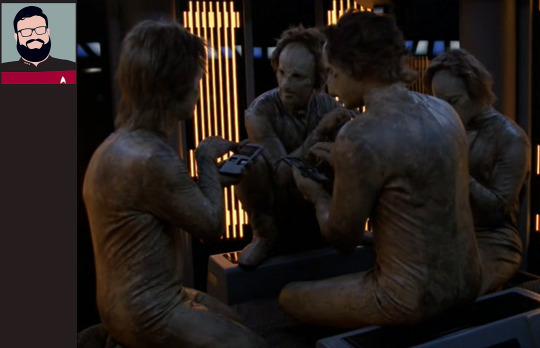
“The Void”: Jake
While this episode might be a little similar to “The Time Trap” from The Animated Series, is that such a bad thing? We get to see Janeway start up her own little mini-Federation in this space pocket and things really pay off! Score one for upholding your idealistic worldview for a change! Plus Jonathan Del Arco as Fantome is just too cute for words.
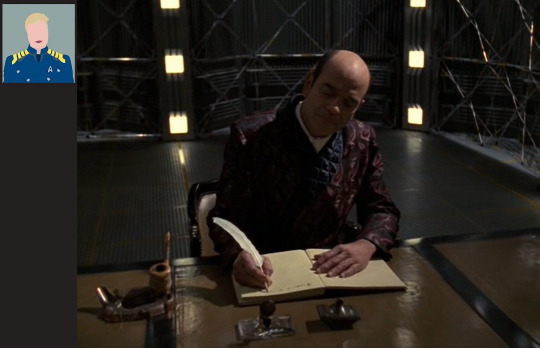
“Author, Author”: Caitlin
There’s a lot going on in this episode, and all the individual pieces are actually quite thought-provoking. From the doctor’s fanfic episode depicting his plight throughout the show, to the crew’s amazing depictions of their caricaturey selves, to the “Measure of a Man”–style debate about the rights of an artificial being (dang, that’s topical), there’s some good discussions to be had here.

“Shattered”: Ames, Chris
This episode could easily have made it onto our Best Time Travel Episodes list if we’d thought to include it. The conceit of having the ship split up into different eras is just so damn clever and allows for a lot of fun references to past episodes without feeling forced. “Shades of Grey,” take note: this is how you do a clipshow in science fiction.
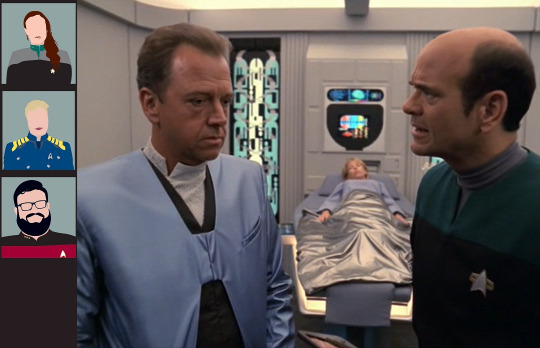
“Critical Care”: Ames, Caitlin, Jake
EMH at his best. While it’s a trend that the Doctor’s personality has gradually turned toxic by this season (more on that below), putting him in a situation clearly in his wheelhouse is a strength. The moral debate of how to treat patients with different treatment coefficients is such a smooth allegory for medical ethics disparities today. It makes you angry. It makes you start connecting the dots. This is what science fiction is for!

“Homestead”: Ames, Caitlin, Chris, Jake
The one on all of our tops list is one that you would never have expected if you’ve been following along since the first season. Your hosts here at SSHB have grown to be such great fans of Neelix (some of us more slowly than others) because of his consistent writing, his profound character development that builds upon his traumatic backstory, and of course his excellent portrayal by Ethan Phillips. And this episode sends him off in such a touching fashion it brings a tear to your eye. Go Neelix!
—
Bottom Three Episodes
But not everything from this season is sparklers and champagne. There were also some icky missteps, missed opportunities, and true bombs along the way home. Grab the first aid kit; these are going to sting:
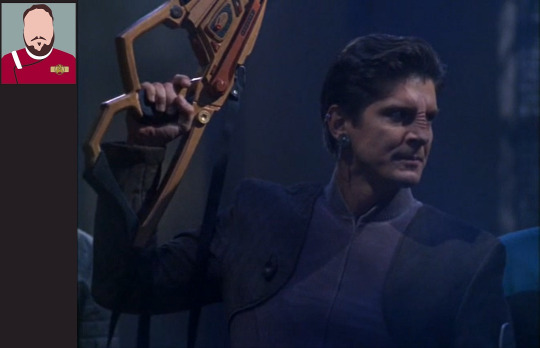
“Flesh and Blood”: Chris
While there’s a lot of good fun to be had in a hologram revolution, this two-parter faceplanted on the landing. Making Iden into some kind of megalomaniacal nutjob utterly compromised the point of an episode that should have been about freedom, the rights of workers, and difficult choices in where your loyalties lie. The way Iden took power so fascistically took the easy way out by negating those conflicts.

“Drive”: Ames, Caitlin
I try to be a big Tom Paris defender on this podcast (like in my defense of “Threshold,” which I still stand by), but boy howdy, does Tom blow it in this episode. The way out of an argument is NOT by proposing to your girlfriend at the spur of the moment. I’m no relationship counselor, but that sounds like the worst time to go making lifelong commitments. Try listening to her first, flyboy. Sometimes you make it really hard to defend you.
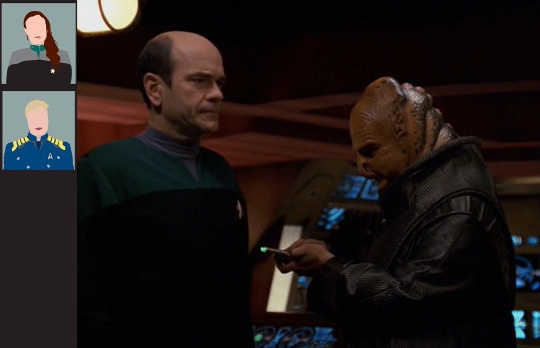
“Renaissance Man”: Ames, Caitlin
I am so utterly confused by this episode. The whole thing feels like it deflates at the end when we realize the Doctor really only had step one of a plan underway and everything else just happened by coincidence. He’s cleverer than that! He outwitted every member of the crew, but he couldn’t outwit two turd people? And that ending love declaration to Seven is just gross and makes me not like him anymore.
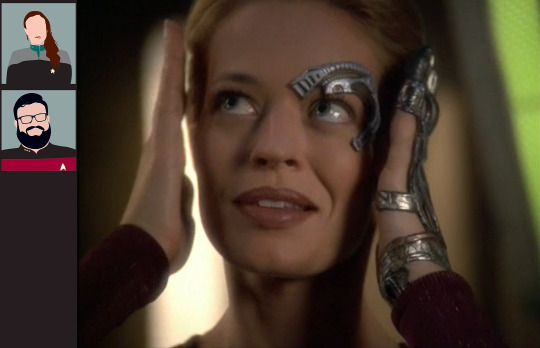
“Body and Soul”: Ames, Jake
Speaking of the EMH being gross, this episode is just a full 45 minutes of cringe. Sure, Jeri Ryan is nailing it every moment, but the takeaway we get is that the Doctor shows no remorse for nonconsensually exploiting Seven’s body, it’s really all Seven’s own fault for never indulging, and she’s the one who apologizes at the end? Doc, I rescind putting you on my Ideal Bridge Crews list. Pulaski all the way.
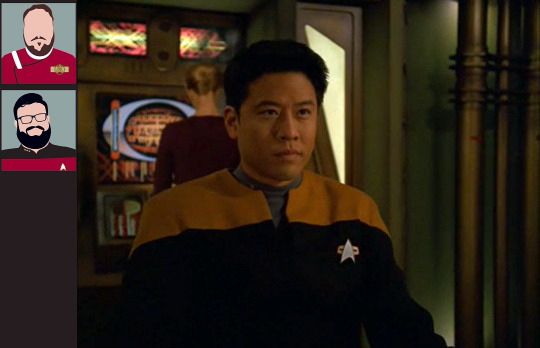
“Nightingale”: Chris, Jake
Sure, it’s a running gag among Trekkies that Ensign Kim never gets a promotion, but I never realized it seemed to be so present on the show as well! If you ever wondered why Harry is our forever-ensign, look no further than this episode in which he’s given a taste of command and fails so spectacularly I’m surprised he had any pips left at all. You did Harry dirty, episode. Real dirty.
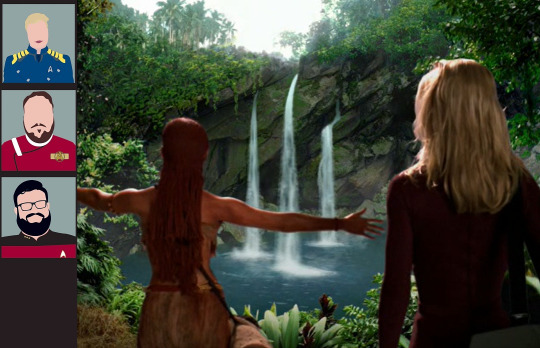
“Natural Law”: Caitlin, Chris, Jake
Finally, one long Prime Directive debate that wasted way too much time with portraying some noble savage tropes and didn’t leave enough room for the actually interesting part! It’s so late in the episode that the Ledosian surveyors get into the Ventu bubble that we really only glossed over the cultural contamination of it all. Oh, and Chris reminds us that he hates Kleg the flying instructor for reasons.
—
All that’s left now is our full series retrospectives, and hey, they’re both out already! Check out our Top 5 Voyager Episodes and Bottom 5 Voyager Episodes lists as we wrap up our journey and get ready to move onto the next era in our show watching. Follow along wherever we take you over on SoundCloud or wherever you get your podcasts, raise your glasses with us over on Facebook and Twitter, and stop being gross to Seven!
#star trek#star trek podcast#podcast#voyager#star trek voyager#top three#bottom three#endgame#the void#author author#shattered#critical care#homestead#flesh and blood#drive#renaissance man#body and soul#nightingale#natural law#emergency medical hologram
2 notes
·
View notes
Note
8, 9 and 14 for the salty ask game!!
8.) Have you received anon hate? What about?
Yup. I don't get it often, but it's happened. Mainly over on FFnet, but I've gotten some questionable commentary on Ao3 too.
Usually it's people pissed off that I'm writing queer fiction. Or people pissed off that I'm writing for queer identities that they want to gate keep. So basically people who are being bigoted about queerness.
There was the angry anon on FFnet who kept calling me a fag. Haven't seen him in a while, hope it's because he's learned to be more tolerant and not simply that he's moved on to other targets. I've had a couple of people react very badly to my aromantic headcanon for the Doctor. Because how dare I not believe they weren't romantically in love with Rose or River or Clara or... whoever. One really indignant person who just could not believe anyone would ship Barry and Eddie because they 'hated' each other. (They didn't? It's okay to not like a ship for no real reason and then just... avoid that ship. Don't have to hate on ships you don't understand, mmkay?) Then there was that one person who told me I was being biphobic for having Anya be a lesbian in a fic where Buffy was starting to realize she was bi. I'm quite serious about that last one, it was such a WTF moment.
I've also gotten some hate for treating characters I like in nice and understanding ways. Mostly Iris. And it's been only a few times, but I know it's just a small taste of the larger hate directed at her in the fandom at large.
9.) Most disliked character(s)? Why?
Mark Blaine. The origin of Chillblaine being that of a Captain Cold knock off in the comics was not a good sign and, to be honest, he was not well served on the show either. The writing for Mark and Frost originally felt like a poor attempt to recapture Barry's chemistry with Len, but this time the straight edition and lacking any actual chemistry. Then when he starts his redemption arc, it feels like it comes at the expense of a lot of Frost's screen time and characterization. The focus was no longer on her - it was on her boyfriend. And then when Frost died to save Caitlin - with Caitlin 'dying' shortly afterwards anyway - the focus of all the grief over Frost and Caitlin was mainly on him. Not Frost and Caitlin's friends who'd known them and loved them longer and knew their histories so much better... Mark Blaine. Who was playing replacement goldfish with Khione, when he wasn't pitching an epic fit about not being allowed to kill-replace Khione with Frost.
14.) Unpopular opinion about your fandom?
There's definitely an issue with parts of the fandom when it comes to accepting characters have messy and sometimes bad reactions to their trauma.
Cisco gets this treatment for S3 where he's grieving his brother to the point where some people still hate him for it even now, seasons later after Cisco and Barry both made amends and came out with their friendship stronger than before. Iris gets it for being angry that Barry sacrificing himself at the end of S3 forced her to relive the same trauma she's already suffered from Eddie's death at the end of S1. Frost gets it for being immature and frightened (and suicidal) in S3 and lashing out at people because she'd never learned how to handle her emotions in healthy ways. She gained so much character development and worked hard to make amends for her villainous start, but some people never acknowledge her character development post S3 because she doesn't apologize in the exactly perfect way. Harry was massively traumatized by his daughter's kidnapping when he first arrived in S2, but he grew to love and be highly protective of Team Flash. Yet some people refuse to see past that first time he called Cisco 'Crisco'.
I'm not saying that everyone has to like all the characters. Or their character arcs. But a well rounded character is not going to be perfect. They're going to react badly to circumstances some times. They shouldn't be defined only by their worst impulses, especially if they're shown to grow beyond those impulses. It's okay to dislike a character without having to 'prove' that the character is morally impure first.
Though, to be fair, the purity culture thing is a problem with fandom at large. And I've been fortunate to avoid the worst of it in the Flash fandom.
3 notes
·
View notes
Text
Ranking the Lisa Kleypas novels I have read
I had been wanting to get into a good romance series for a long and couldn't find anything I really liked. I saw someone say that Chasing Cassandra stood out among the romance novels they had read so when I found it at my library in April 2023 I decided to give it a try. I really enjoyed it and decided to continue with selected Ravenel books and also some from the Wallflowers and Hathaway series too. Here's my ranking so far (major spoilers under cut).
The Devil's Daughter (Ravenels no. 5)
I loved this book! I've seen some say that it's not their favourite because the stakes are relatively low, but my possibly controversial opinion is that Lisa Kleypas's writing can carry low stakes situations really well and that these give her characters' internal struggles more spaced to be fleshed out, which I sometimes find is lacking in her novels that feature high-stakes situations. I liked the pastoral setting here and the descriptions of farming that went along with West's self improvement plotline. I also really enjoyed Phoebe's retreat from grief over her first husband as she begins to make more independent decisions about her life. I personally thought the scandal regarding Phoebe's original almost-fiancé who was stealing money from her sons and also hiding a mistress and illegitimate son was well done and I remember gasping when she asked him why he was so interested in her sons when he clearly didn't care about his own (tbf it doesn't take much to make me gasp but. still.) I also loved seeing West as a father figure to Justin and Steven. Imo that makes perfect sense as the next step in his maturation arc and felt very natural. And ofc it was great to see Phoebe as a widow and single mother get a second chance at love after everything she went through. 4.5/5 stars.
Devil in Winter (Wallflowers no. 2)
For all practical purposes this can be called the novel that started it all because Sebastian and Evie appear SO OFTEN in the Ravenel series, which is fine I liked seeing them there but was nice to get some context on who these people actually are (I didn't read this after reading the Ravenel books). I wasn't sure I was going to like this when I started bc I did not like the way Sebastian treated Evie and it lasted for what felt like a LONG time into the novel. But after finishing and seeing how far Evie had come in her ability to stand up for herself, particularly after experiencing such awful abuse during her childhood, I think Sebastian's bitchiness for lack of a better term provided a space for her to gradually develop the bravery to stand up against someone who was never really a threat to her. I can see now how crucial that was in developing her confidence to the point where she could demand that he sacrifice himself for her (in the funniest way possible by making him swear a vow of celibacy for three months). I also loved the scenes of Sebastian languishing with his fever after getting shot, particularly the role reversal with him begging Evie to protect him from the doctor who wanted to bleed him--would that all men like that would have a brush with death and see the error of their ways. His love confession at the end brought a tear to my eye because you know he wrestled A LOT to get to that point and I simply love it when suffering brings purgation and redemption its the Catholic that's still remaining in me. 4.5/5 stars.
Chasing Cassandra (Ravenels no. 6)
This was the first Kleypas I read and while I thought it was great at the time I retroactively liked it more after reading the other books in the series. I think it's in Devil in Spring that Gabriel sees the twins Pandora and Cassandra standing next to each other and thinks that while Cassandra is beautiful she's not remotely interesting to him. (I may be misremembering the specifics but ik that scene appears somewhere). I like how Kleypas allows Cassandra to have a more mild and conventional personality in contrast to the subversive women around her while still giving a lot of validity to her particular struggles (feeling bereft after Pandora marries, her weight, her comparative shyness, etc). I thought Tom was a great match for her despite becoming infatuated with her the second he saw her and I appreciate her power to crack through his lifelong emotional issues and start reconfigure his whole sense of self in the process lol. There's no major scandal or high-stakes plot in this novel, but what I liked the most was how funny I found it. The scene where the Ravenel clan is sitting in the parlour after Cassandra's reputation has been compromised and Tom barges in to announce he's got The Solution to their problems (himself!) made me laugh, and so did the scenes where they were negotiating their marriage contract. And ofc reluctant adoptive father Tom Severin was a delight. 4/5 stars.
Devil in Spring (Ravenels no. 3)
I adored Pandora. This was my first experience with a romance heroine who is physically disabled (hard of hearing and balance issues) and also likely on the spectrum (to my knowledge this has never been confirmed but definitely what I assumed when first reading and seems to be a widely accepted interpretation along with speculations of Pandora having ADHD as well). I thought Kleypas portrayed her social struggles and traumatic childhood with so much empathy and I loved seeing be accepted into a functional family through marriage to Gabriel. I liked that this novel confronted the enormous restriction of rights that marriage put on Victorian women and Pandora's and Gabriel's attempts to grapple with that and work out the most equitable set-up for Pandora before they marry (with a heavy side helping of Gabriel thinking 'why doesn't she trust me?' which felt v realistic). I didn't love the Fenian (or I guess just Fenian-esque? I honestly can't remember) plot in the second half because it came out of nowhere and ultimately seemed like a very convoluted way of setting up the scene where Gabriel tells Pandora he doesn't love his former mistress lmao. But I did love seeing Pandora's board game business that she worked so hard at in previous books succeed in the end and to see Gabriel character develop with some unconventionality interjected into his picture-perfect life. 4/5 stars.
Marrying Winterbourne (Ravenels no. 2)
I thought the plot of this book was super compelling, but I didn't connect with Helen as much as I did with Pandora which Is why I put her book a slot lower. I thought she was wonderful, though, and I do think her experience as the eldest daughter in a very dysfunctional family was interesting to read about and added a lot of depth to her character. I also think the fact that is able to maintain so much poise and dignity in spite of all that she's endured indicates how strong she is and sets her up really well for her interactions with Rhys in this book. I thought the parallel of Helen and Rhys each feeling like they were unworthy of the other because of their origins was very well done and the climactic scene in the railway station actually mad me tear up because it was SUCH a relief after absorbing so much of Helen's agony for so long in this book. The adoption that takes place at the end felt v. redemptive and meaningful after so much angst about parentage and how awful it is to feel unwanted by family. Kleypas ending the novel by having Helen acknowledge herself as a member of the new family that she and Rhys are going to create was a perfect imo. 4/5 stars
Married by Morning (Hathaways no. 5)
I think one of the reasons this one didn't rank higher for me is because it's the only Hathaway novel I've read and also the last book in the series. I was intrigued by the premise bc I'm a big fan of Jane Eyre and this is another Governess Romance where Catherine is the governess of Leo's youngest sister. It was clear in this novel that they have a long-standing, slightly antagonistic relationship and I think it would have hit harder for me if I had read the earlier books and got to see it develop, but alas this was the only Hathaway book at my library. That's not to say I didn't enjoy reading their interactions though! I liked Leo's snarking about Cat's intentionally bad Poetry for Young Ladies and also how everyone in the family accepted that Cat is very kind to Beatrix but chooses to be the most disagreeable and antagonistic she can be toward Leo and they're all okay with it lol. I think this is one of the only romances I've read so far where the heroine has a temper that's not so much feisty but more broody and irritable in the way male romance heroes are often portrayed, and it was good that Leo acknowledges this as something that is just a part of Cat rather than something that will be fixed by the power of true love. Ofc we later find out that some of Cat's issues are the result undergoing a TON of trauma in her formative years, and I like how this contrasted with Leo still finding his way out of his own trauma re grief and addiction and trying to reestablish himself in the family as the responsible eldest son. Unfortunately however I don't think ending the book by piling more significant trauma on Cat (and Leo by association) was the right choice, esp since there wasn't enough space to deal with the effects bc it happened so close to the end of the book. However, the epilogue does imply that they have helped each other heal over many months and that their relationship has moved toward engaging each other in conversation rather than argument, which felt very fitting for them. And I'd be remiss if I didn't mention that Cat is bespectacled and there's a scene where Leo buys her a fashionable new pair of glasses. Massive W for glasses-wearing readers everywhere. 3.5/5 stars.
The Devil in Disguise (Ravenels no. 7)
I really didn't like this one, sorry to any fans out there. I wasn't able to connect with Merritt and did not have strong feelings at all about her relationship with Keir, though I did appreciate him telling her that her first husband was a POS for saying he needed to spend some time away from her after learning she was infertile and then proceeding to die in a shipwreck. I thought having the Scottish hero be a whiskey distiller was a bit too stereotypical even for a romance novel and the technical descriptions of farming in Devil's Daughter did not work for me here when applied to whiskey-making. I also did not love the phonetically-rendered Scottish accent, so that ruined most of Keir's dialogue for me. IMO very few people are able to pull off a phonetically-rendered accent in writing and Lisa is no exception unfortunately. I can't remember much of the plot of this book except that there is an explosion at some point and then a HUGE reveal that has major implications for other characters in this series and the Wallflower series. Unfortunately tho this book passed me by so much that I didn't remember what it was and had to reread a summary before writing this, which is crazy if you know what the scandal is. I also thought the ending of this novel was a cop-out considering all the emotional work Keir in particular had to do with his own concept of family...and for what? But at least this book addresses the results of men choosing to thot it up for large portions of their lives I guess. 2/5 stars.
My next plans are to read It Happened one Autumn and eventually Mine Til Midnight bc I love Cam Rohan's character and Amelia's from what we saw of her in MbM. Tell me what other Kleypas books are good or what romances by other authors I should try next.
#i will say i love how family oriented these books are and that kleypas understands that dysfunctional families can still be v loving#i also love the humour--that's what stood out to me when first reading chasing cassandra. it was funny and clearly on purpose.#some of the romances i'd read prior had me laughing bc they were ridiculous so that was a nice change#lisa kleypas#romance novels
1 note
·
View note
Note
Wrote a massive ask about something, change the subject like two times, and now im starting over cuz NOW I know what I wanna talk about.
I've figured out a few reasons why so many people don't like deku. Of course there is the usual, he doesn't fit really any of the cookie cutters that make most shonen characters (however, characters like Todoroki and Bakugo do, and despite their flaws, everyone fucking drools over them constantly).
My next point: deku doesn't talk about his trauma. His entire life is fucked up, but hes pretended forever that its fine and normal, which has influenced us viewers horribly so that we don't see how messed up he is. We forget what has happened to him and all we see is this pathetic scared teenager who cries at everything because that's basically how he acted in the first like 4 episodes. Bakugo himself has even said deku doesn't really look at or think about himself at all (also demonstrated in like literally everything he says and does) and so we have seen hardly any of his pain. The doctor scene and the scene where his mom apologizes and cries is JUST the beginning. The events of the first episode were a sample of his everyday life (minus meeting all might or running into a villain ofc). We forget the entire fucking decade between these moments. A DECADE OF EPISODE ONE. Think about that.
Now I'll compare him to Bakugo and Todoroki, two beloved characters who get much less backlash, if any. Bakugo has talked about how he knows he's messed up, we have seen him change, and I guess he's more relatable somehow. Todoroki has talked openly about his trauma, we have seen chunks of it, we have seen the absolute worst of it (his mom and the boiling water probably) and we have seen him grow as a person (his entire character arc and also how he treats his dad after the tournament arc). We know him, we've seen him struggle and we see him moving past his animosity towards endeavor. He has asked for help and advice from him too.
Do I see anyone calling Todo an abuse apologist? No. Do I see people forgiving endeavor as easily has they did Bakugo? Absolutely not, which is not a bad thing, but the amount of people I've seen basically idolizing bakugo despite his past mistakes is almost astonishing to me. Of course many people can and should forgive baku, but no one loves deku like they do todoroki. Todo isn't in 2nd or 1st just cuz he doesnt get anywhere near as much screentime as deku and baku, and also prolly cuz he is not as relatable as bakugo, just like deku. Deku gets so so much shit and for what? You didn't like how he acted in the beginning of season one?
In conclusion, I am mad about how much hate deku gets, I wrote too much about bakugo and endeavor parallels when they shouldn't really be compared but its not my fault cuz all might himself has also pointed out similarities, and you probably know exactly who is writing this even tho I decided to go incognito and I cant remember why. Sorry I wrote you an essay<3
this has been in my inbox for a fair while and im sorry for the delayed response but you hit the nail on the head!
i feel like people go into a shonen, not expecting to be hit with a main character who despite being emotional, still hides a lot of stuff about him and his past. from both the cast, his friends and teachers, and us as the readers/audience. deku is a rather real-feeling character, who has gone through trauma and hasn’t had the chance to speak out. he’s instead decided to bury it within, trying to push it to stay in the past as he feels his current life is now better and free of all those troubles.
he bottles a lot of things up. it leaves an ever-lasting effect on him, even after he receives one for all and gets into ua. and for viewers who understand, they come to greatly love and appreciate his character and the growth he goes through, while noting how he has yet to face his past. people who don’t understand however, do just see how you worded it. a pathetic scared teenager who cries at the drop of a hat. him crying is such a noticeable trait within the first season, especially as a lot of his development past that has been a lot more subtle in comparison to todoroki and bakugou.
deku dives in and is reckless, and his flaws bubble at the surface a lot whenever he’s in focus (not that flaws are bad - good characters will have flaws), and people will often tend to heavily criticize him if he acts too differently from the deku they’re used to. crybaby deku. despite the fact those very same people want a more confident character. they want more fights. they want a character like bakugou or todoroki. yet whenever deku doesn’t act like the deku they know, it serves as another ‘reason’ to hate him, because they claim his character isn’t consistent, or that because he is reckless, he deserves consequence.
a lot of people who hate on him fail to see just how interesting of a character deku is however, for the role he’s taken and especially with the current setup horikoshi has given him to finally confront past deku, and to hopefully stop being so reckless. he’s yet to have a big character shift that turns readers heads.
but its coming, and i wholeheartedly believe in horikoshi to deliver.
786 notes
·
View notes
Text
I'm not too pleased with some of the new developments in Milgram, and I'm not talking about the reason Yuno was brought into the prison. Spoiler alert for the Milgram novel and Yuno's second voice drama.
So it seems like the main Milgram project might be heading towards the same "there are dead people in Milgram" scenario as the novel. To be honest, I'm not a fan; I feel like having all the prisoners fade away after their judgements removes a very interesting dimension to the meta-voting. It means that as long as we don't let them kill anyone inside Milgram, it doesn't matter if they're otherwise falling right back into the mental ruts that led them to murder (other than Yuno) to begin with. Presumably 'lost' still means deader-than-dead, soul lost forever to the void, but we don't even know if that's worse than being voted guilty. And considering how ambigous both the novel and most media in general are about the afterlife, we're probably never going to know.
I'd be more alright with it if it turns out not everybody is dead, but I also doubt that. It was exactly the case in the novel, and it'd create a big disparity between those who are at least theoretically capable of going home at the end and those who just get beamed up into the light. And having it be some sort of Purgatory does allow the writer to neatly sidestep the question of how the prisoners got there and where is the prison supposed to be located. All the stuff about brainwashing and telepathy and mysterious languages does require a turn towards either fantasy or sci-fi, and it's not looking very sci-fi so far.
I guess the one silver lining to this is that my MeMe theory about the bathtub scene actually showing a suicide just got a lot more likely. Honestly, I figure most of the cast died by suicide, since for most of them there's not other obvious factor that could've killed them and they're pretty messed up mentally by their crime. Shidou's case is the most obvious: not just because of his attitude, but because I've heard that being a doctor is a big risk factor in suicide. Not just because of the crazy hours and the inevitability of someone dying under your care, but because you have access to all the drugs necessary to die painlessly and know exactly what the right dosage is. Like, I realize it sounds super mean but more than once I've looked at Shidou and thought "How come you're still alive?".
(There goes another reason why I don't like the "everyone's dead" theory: If Shidou's forgiven character arc is supposed to be that he gets over his paralyzing self-hatred so that he can help others like he originally wanted to, having him just die at the end is a terrible conclusion. Even if they frame it as "Ooh, now that he's done good again he can pass on peacefully", it just falls flat. They're replacing the implicit promise of a future of hard-fought contentment and saving many people with vague heavenly imagery and "Well, he killed an unspecified amount of people but he also saved Mahiru, who is of course way more important because she's not a faceless extra. No reason to hold onto his guilt at all anymore, surely!")
Anyways, since for most of the characters suicide seems like the obvious option, here's some speculation about what the other prisoner's might've died of:
Kotoko: This one's easy. She's been attacking violent criminals and landing them in hospital but, crucially, leaving them alive to hold a grudge. All the martial arts skills in the world won't save you if you get ambushed by a bunch of armed people.
Amane: This dovetails into a mini-theory I have that Amane wasn't actually supposed to murder the person who got medically treated, it's just that she was desperate and jumped to it as an obvious and sufficiently extreme way to repent. Kinda like how Muu claims her murder was necessary in order to stop the bullying, even though if you think about it there's no way it would make her less ostracized (and if her goal was just to have people stop attacking her and not mending things with her ex-friends, she could've switched schools anytime). Therefore, I think Amane may have been executed as the cult took justice into its own hands, or accidentally killed while being heavily beaten as punishment or 'cleansing'.
Yuno: She tried to perform an abortion herself, presumably from finding out she was pregnant too late for legal abortion, and died from complications It could also be something like being murdered by a jealous client, but I feel it would really undercut her whole "I knew what I was doing and it was my choice" thing. You could say the same goes for accidentally killing herself by doing a medical procedure she had no qualifications for, but at least that's her own choice and not the unintended actions of a third party.
#milgram#tw suicide#tw child abuse#tw religious abuse#Though really the last two are only very briefly touched upon
15 notes
·
View notes
Note
Hi!! I love your final fantasy tactics fanfics. What is your thought process when writing? How do you try to interweave your own headcanons with the game’s lore? Do you like playing any other strategy rpgs? :)
Thanks so much for letting me know you like my work!
To answer your questions: My thought process when I'm composing is generally shaped by the circumstances of the composition. A lot of my fic was made in relation to prompts (from twitter, from friends, for exchanges/fests), and I find that when I'm writing under constraint I tend to have a lot of cool and unexpected ideas that I later incorporate into my personal take on the canon (I came up with a ton of my characterization for my forever faves the older Beoulves this way as well as basically everything about my functional OC Rad). Longer stuff generally coalesces from scenarios/thoughts that have been tossing about in my mind for a while, and it often gets scoped down a little so that I can ensure I actually put it out in the world instead of having it sit in drafts forever. "Let Your Curse Be On Me" and "The Cuckoo" both had their seeds as mods I daydreamed about making. "Contempt's Bloom is Forever" actually has about 6K words I drafted before I decided to re-render it as a double drabble sequence. When I actually sit down to compose write, I think a lot about literary moments I like, moments in my life I found emotional, and whatever earworm is caught in my head. I have many many incomplete playlists that I jam to for certain scenarios/characters.
When it comes to mixing headcanon and canon, I tend to see what's portrayed in the game setting up some boundaries of characterization I can push up against but never quite pass. I can make Dycedarg sympathetic but I can't make him good. Wiegraf can become softer but he can't become servile. I love that a game with so many detailed infodumps still has big gaps in its lore that fic authors can fill out, and I try to take advantage of them. I love speculating about the Fifty Years War and how it fucked everyone up, and my favorite characters to write about are almost all NPCs and enemies. I honestly find much of the main party a little hard to handle, given that they're front and center while remaining so full of ambiguity. It's perfectly possible to have Agrias or Cid die and crystalize in your first random battle after they join up and the end of the game won't change for it; there's not a perfectly clear sense as to what end they're trending towards. With characters whose arcs are small but have clear ends, I feel like I have a lot more room to expand and a lot more guidance as to where I'm going--so a lot of the ideas I develop start with the game's cast of doomed boss fights. Overall, a lot of my headcanons have developed and grown more calcified over time (I have a hugely dorky pre-canon timeline I made laid out as a spread sheet with various major characters' progressions) and at this point, I just sort of treat them as an established part of what FFT era Ivalice is for me.
As for other strategy RPGS… er… I have plans to actually play non-FFT ones (TO: LUCT's high on the list) when I finally get my doctorate and the mythical free time being post-defense will possibly get me. I have a lot of plans for then. We'll see how I'm hanging onto them next year.
Hope that response was the sort you were looking for. :)
4 notes
·
View notes
Text
Blooming Brilliant, an Aroace Willow Park Manifesto

[id: a gif of a heart locket opening. One half of the locket displays a picture of Willow Park from The Owl House, winking and making peace signs with her fingers. Blue and yellow stars surround her. The other half reads "willow park my beloved." /end id.]
Greetings! It’s me, User Aroclawthornes, and instead of working on all the time-sensitive homework I have I sat down and wrote an essay explaining why I think Willow Park OwlHouse could plausibly be read as aroace, and why it would be a thematically enriching interpretation. I’ve never written anything like this before, so it’s oddly formal, a little pretentious, and contains a lot of qualifying language, but I'm confident that it gets my point across. I’m not intending to speak over other interpretations of Willow or assert that it's the only true way to read her, but it's a headcanon I find interesting, and I think there’s a lot of evidence to back it up, between certain elements that Willow’s arc employs to some good old overanalysed symbolism. If you're aspec, I hope this is validating; if you're not, I hope it's interesting; if you don't care, scrolling past it is quick, free, and easy.
Some disclaimers on terminology: I’m speaking from an aroace perspective, and so when I say “aspec coding” I’m generally referring to both orientations as a catch-all - a lot of the coding surrounding Willow could go either way. I’m also going to be talking about commonly accepted “aspec” narratives, but I’m aware of the limitations of this insofar as my experiences are only a single facet of the diverse range of aspec people in this world, so anyone who wants to add or argue anything - respectfully - is encouraged to.
Analysis below the cut!
The Thing About Plants
I’m not going to pretend that an association with plants is historically indicative of aspec coding, because, frankly, there haven’t been enough aspec characters to establish it as a convention, and it’s also a fairly wide-reaching branch of symbolism. However, I am going to propose that lighthearted comparisons between asexual people and plants (however misguided on functions of plant reproduction they are) are fairly common elements of budding ace teenage humour, as are related quips about photosynthesis.
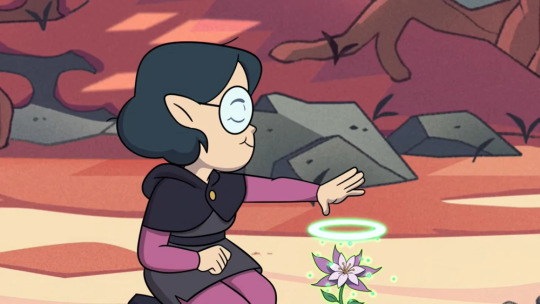
[id: a screenshot of Willow from "I Was A Teenage Abomination", depicting her sitting on the ground while casting a spell over a small, pink flower. /end id.]
I’m also not going to claim that the colour green Belongs To Aromantics, and therefore that All Plants Are Belong To Us, but in tandem with everything else I’m about to cover, the connection between Willow and plants seems like a fairly plausible nudge to a relatively common element of aspec humour.
“Half-a-witch” Willow and the Late Bloomer Experience
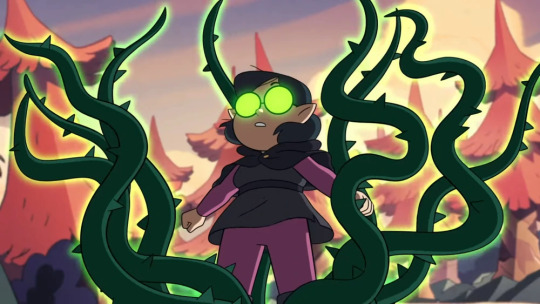
[id: a screenshot of Willow with glowing green eyes, from "I Was A Teenage Abomination", depicting her summoning a mess of thorned vines. /end id]
Willow is literally nicknamed “half-a-witch”, in reference to her supposedly incomplete state - this is a sentiment eerily reminiscent of the pressure to find one’s “other half”, which affects aspec - especially aromantic - people particularly profoundly. She’s considered a late bloomer, someone who hasn’t reached the societal milestones of growth at the expected age, and who is derided and considered immature as a result of this perceived failure. However, we quickly discover that Willow is, in fact, an exceptionally competent and powerful witch - taken out of the restricting frame of the Abominations track, she’s able to grow into her own, “complete” person, therefore proving that she was never really lacking in anything in the first place. Like real-life aroace people, she was perceived as limited and immature based on the expectations and judgements of other people, but Willow was never deficient in anything, least of all herself.
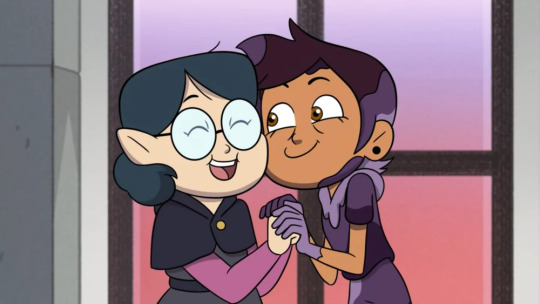
[id: a screenshot of Willow and Luz from "I Was A Teenage Abomination". They are holding hands - the former is laughing with her eyes closed, and the latter is grinning, while covered in abomination goop. /end id]
As far as symbolism goes...the track Willow is initially put in literally requires her to conjure up another humanoid entity, with the expectation that she will therefore prove herself to be a whole and mature person. Only with this ability, she’s told, will she be successful and happy as an adult. The shapelessness of her attempts at conjuring an abomination reinforces this connection in my mind - if I may reference this quote from Ducktales 2017‘s (absolutely stellar) A Nightmare On Killmotor Hill, in which the protagonists explore their own subconscious fears via. the dream realm, for a second:
“I think that’s supposed to be my romantic interest, but I’m too threatened by the concept, so it never takes shape.”
A lot of young aroace people find themselves in situations where they attempt to convince themself of their interest in someone in an attempt to be “normal,” or end up lying in response to family members or friends’ questions about crushes. While Willow’s abominations, first and foremost, represent the expectations from her school, classmates, and family to be a successful, “complete” witch with a profitable future, I think that with an aroace interpretation of Willow they could also very easily be read as representing some latent insecurities over a lack of attraction, or pressure to find a significant other.
(I’m not condemning Willow’s dads, by the way - they seem like perfectly lovely fellas, and I’m confident that they were doing what they thought was best for her. They’re certainly very quick to drop everything to assure her future in Escaping Expulsion, so obviously they care about their daughter very much.)
Greens, Blues, and Yellows: Colour-Coding Willow Park
A while back, I made this post comparing Willow’s palette to the aromantic and aroace flags:
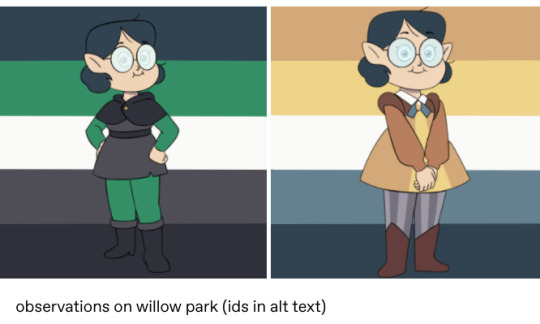
[id: a screenshot of a post depicting the aromantic and aromantic asexual flags, colour-picked from images of Willow in her Hexside uniform and casual dress respectively - these are overlaid on top of the flags. The caption reads "observations on willow park". /end id.]
The grey-and-green aromantic flag has long been the accepted mainstream symbol of aromanticism, and, as the above post - and many others - demonstrate, Willow’s palette reflects it near-perfectly. This could easily be a coincidence, owing to the palette of the standard Hexside Plant Track uniform, as well as her hair and eye colours - which are obviously supposed to be reflective of her plant-related abilities. However, given how fond of employing hidden meanings The Owl House has shown itself to be, I don’t think it’s far-fetched to claim that there’s at least a chance that her palette was constructed with the flag in mind.
The latter is...a bit more problematic for me, although it’s fun to joke about. The blue-and-yellow aroace flag was only created in December 2018, relatively late into The Owl House’s initial production, and it’s still relatively obscure, although on the rise in popularity as the accepted aroace flag (I only recently started using it myself), so I don’t know if Willow’s casual wear is enough to verify the presence of any deliberate subtext. I think it’s a fun coincidence, however, and (as was pointed out in this post) it’s cool that these blue and yellow stars surrounding Willow occur in the same frame as Luz’s bisexual decor:
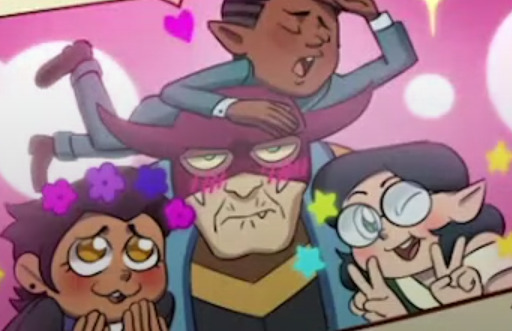
[id: a photograph of Luz, Gus, and Willow, all surrounding a disgruntled-looking Principal Bump. Luz has flowers in the colours of the bisexual flag decorating her hair, while Willow is surrounded by bright blue and yellow stars. /end id.]
also seen above: powerful bi/aspec solidarity
Conclusion:
Do I genuinely believe that Willow is being deliberately written this way? If you’d asked me, say, two months ago, I’d have said probably not - as far as queer representation in kids’ cartoons has come, it has a ways to go, and focusing on transgender characters seems like a more obvious (and equally invaluable) route to go down. I can name maybe five explicitly aspec characters off the top of my head, two of whom have been written as alloromantic and/or sexual in adaptations or continuations of the source material (I have...some grievances with 2005 Doctor Who). But the emergence of Raine, an explicitly nonbinary character on Disney Channel, has given me a little spark of hope, and so, even if it’s never confirmed, it’s comforting to be able to see a character with such strong elements of aspec coding and think to myself, just maybe, that there might be some intent behind it.
I also...really want to see interesting things done with Willow. We’re halfway through Season 2, and despite some promising setup for her arc in the Season 1 finale, she’s sort of been left by the wayside lately in favour of developing the more “plot-relevant” characters, such as Luz, Amity, Eda, and Hunter. Frankly, I think it’s a disservice to her Season 1 development, despite how much I adore all the characters I just listed - beyond any personal motivation, the prospect that Willow could be aroace adds a lot of sorely-sought depth to her, and, as detailed, a lot of this has already been set up in her earlier episodes. I just...I think it’d be neat. Rarely do you get a kids’ show so brazenly queer in its themes as Owl House, and aspec people deserve to be included in that.
Willow would also be great aroace representation because, well - those five or so aspec characters I mentioned being aware of are all white or “raceless” (...also written as white, basically), and so an aspec Asian character would be a really lovely step forward in this area. Additionally, all the characters I referred to are also conventionally skinny, and Willow is not only fat, but written in a way that doesn’t treat this feature as a caricature. People who are more knowledgeable on these topics than I are absolutely free to make additions, as is anyone who feels like I’ve left certain details out.
tl;dr: Willow’s association with plants could be read as a cool nod to aspec humour, her “late bloomer” narrative is eerily reminiscent of some common aspec experiences, her palette speaks for itself, and it’d be really cool if we could diversify the so-far fairly bland sphere of aspec representation.
I’m going to conclude this by linking Rose by The Oh Hellos, because they’re my favourite band, they share The Owl House’s initials, and I also think it’s a good Willow song. Peace out.
youtube
#the owl house#willow park#pspspspsps you will read my 1.5k word aroace willow essay#hooting#meta#willow#aroace willow manifesto#fuck it. this is getting posted
35 notes
·
View notes
Text
Arsenal Military Academy (2019) Full Review
My first impressions of episodes 1-13 can be found here. I think I was a little dubious at first, but now that I’ve finished the drama, I have to say that I really enjoyed it. This is going to be a short(ish) review because I just don’t have much to complain about. [SPOILERS AHEAD]
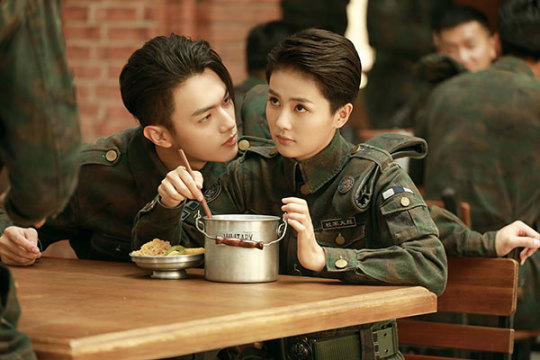
The Leads
Xu Kai shines as Gu Yanzhen. Much more than he did as Mo Qing in The Legends. Gu Yanzhen is just such a fun character. While yes, he is an overgrown and spoiled rich kid, he has a great character arc. He learns how to be responsible, caring, devoted, and considerate. Whether it’s love or serving his country, once he’s devoted to something, he’ll put his whole heart into it, which makes him a great friend and leader. And despite his maturation and all that he’s been through, he still stays cheeky and playful until the end.
That’s what I really like about this drama. It’s consistent. Both in terms of plot and character. And for cdramas, consistency is something that’s often butchered. This drama is 48 episodes long, which was perfect for developing all the plot points in the story. At first I was worried about the length. But the plot is so well-paced. There was no filler, and if there was, then I didn’t even noticed because I enjoyed all of the scenes and interactions between the characters.
Bai Lu was great at switching between cross-dressing as her brother, and being her “true” self. She carried off being both masculine and feminine, and I enjoyed seeing these two sides of her character. What I also appreciated about this drama is how even when she is revealed to be a girl, nothing really changes in terms of how she acts or how she’s treated by others. Her classmates still call her by her brother’s name. She wears the same clothes, talks the same, walks the same. Of course, by that point, most people have already found out, but for the characters who haven’t found out yet, they don’t dwell on this revelation. They don’t say sexist things about her appearance or mannerisms. They treat her the same as they always have. At first, I was worried that the drama would have a dramatic plot shift after her identity is officially revealed, but there wasn’t a shift. Her reveal was actually not that big of a plot point. (Yes, she was put in prison and accused of killing the chief, but this was resolved in like 2-3 episodes). It blended in seamless with the rest of the plot, and there were bigger issues in the story to address.
In my First Impressions review, I complained that Xie Xiang was a bit of a flat character. I still think she’s a little underwhelming in comparison to some of the other characters in the drama, but she was watchable and relatable, and she definitely grew on me more as the drama went on. I also applaud her for recognizing her feelings for Gu Yanzhen (I was worried that the drama would make her be conflicted between them), but she did frustrate me a little with how she couldn’t be upfront with Shen Junshan and just strung him along.
Again, I liked seeing the different sides of her character. Xie Xiang was never a tomboy growing up. She likes theatre and the arts. She likes acting, dancing, and singing. She likes dressing up and accessorizing (when appropriate). Her best friend, Tan Xiao Jun, acts as a foil and shows us what Xie Xiang is really like (or used to be before joining the academy). But her brother was a huge influence and inspiration for her. She learned how to fight from him. She learned what is means to be righteous and fight for justice from him. But she doesn’t want to become him; she just wants to fulfill his dreams. In the academy, she isn’t the best student, nor does she want to be. She doesn’t want to compete with the others, but she just wants to best the best cadet that she can be. It’s all about challenging herself and pushing her own limits, not comparing herself to everyone else in the class.
Supporting Characters
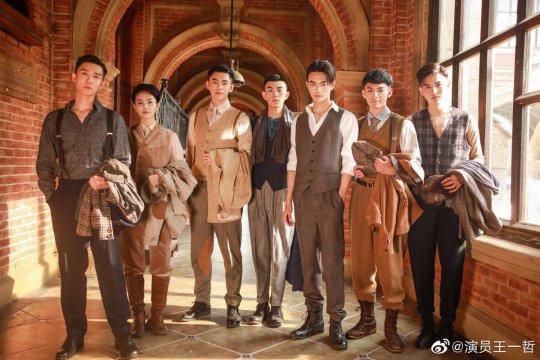
All of the secondary characters are great. Side characters and villains all served a unique purpose. Villains, such as Jin Xin Rong and the bully in the academy, were sympathetic characters. They all had their own backstories and development arcs, but they didn’t detract from the focus on the leads. In fact, the drama never strayed from the leads, unlike some cdramas were sometimes the focus would move away from the protagonists as the drama dragged on. Importantly, all the subplots were interwoven, and each mission that they completed progressed the plot and developed character relationships. I had a lot of praise for Qu Manting in my First Impressions review, so I won’t go into it again here, but she was a great second female lead (even though I did wish that she had less scenes with Gu Yanzhen). I was also surprised that she’s my age (and also Xu Kai’s age). She’s such a mature and steady actor.
Edit: Just found out that Toby Lee who played Shen Junshan was the guy in Soulmate?? Didn’t recognize him at all.
Plot
I loved the humour in this drama. It was quick, witty, and smart. But the drama did take a serious turn in the last arc where there were deaths of 3 prominent supporting characters, which was really surprising. I thought the drama would be a light-hearted comedy all the way through. So when I saw that it was possible for a prominent supporting character to die, I realized that there could be some real and serious consequences for characters in the drama.
Speaking of deaths, I was also surprised by the amount of violence and liberal killing in the drama. The cadets at the academy never hesitated to kill, and murdering people never affected them. The writers justified the deaths by dismissing the victims as being traitors to the country, whether they were just a driver or security guard for the Japanese or a Japanese nurse or doctor. If they were affiliated with the Japanese and got in the way of a mission, then the leads would kill them. At times it felt like a video game because the cadets would use so much gunpowder to just plow through anyone who was an inconvenience to the mission. The drama also really advocates revenge, which was also really shocking. Revenge can be engaging to watch when it’s fictional, but I don’t morally agree with revenge, so I was surprised that a drama with so much killing and a revenge fetish was allowed to get past censorship.
Overall, the plot was really good. The drama rarely ever dragged, except for maybe episodes 22-26 where it felt like Gu Yanzhen didn’t really have anything to do with the main plot, but the drama recovers quickly after that. Episodes 16 and 31 are probably my favourite in terms of interactions between the ML and FL. 17-22 are when they’re separated and bond with the supporting leads instead. That was clearly a purposeful move by the writers. They gave us peak sweetness between the leads and then separated them immediately afterwards. Those episodes made me worry that they would be angst, but there wasn’t. Those episodes showed that even when the leads were separated and went through hardships with someone else, they still thought about each other. Again, another example of how every mission progresses the plot and develops character.
In terms of the romantic plot, I would say that about three quarters of the drama is about characters liking people who don’t like them back, and what you get is a convoluted love rectangle that expands to a pentagon. What I like about Gu Yanzhen is that while he can be childish and obnoxious, he gives Xie Xiang a lot of space. There were some scenes when either Huang Song or Shen Junshan was trying to pursue her and I was like, why isn’t Gu Yanzhen here to intervene? But then I realize that it’s actually good that he isn’t constantly stalking her. Gu Yanzhen may seem possessive at the academy, but he doesn’t prevent her from doing things either on or off campus. On the other hand, when Shen Junshan figures out Xie Xiang’s true identity, he acts entitled to her to the point where it feels manipulative. He would tell Xie Liang Chen that he’s meeting Xie Xiang for lunch, knowing that this would prompt Xie Xiang to dress up and rush off campus to meet him. He changed her room without asking her first, saying it was for her own good. I might have to rewatch the earlier episodes, but I don’t think Gu Yanzhen ever used her secret to underhandedly leverage power against her like that. I don’t think he ever tried to “test” her. It was only after she found out that he knew when he started to teasingly blackmail her with her secret in order to get her to wash his clothes or be nice to him, but this was done upfront to her face, so she knows what she’s dealing with. And also despite being constantly annoyed by him, Xie Xiang feels very comfortable with him. She trusts him. She knows that no matter what, he would never share her secret, so she was able to be herself with him from the beginning. In contrast, there was always a distance and formality between Xie Xiang and Shen Junshan, even though they went through a lot together.
The bigger question is why Gu Yanzhen fell for Xie Xiang instead of Qu Manting. I think it has to do with how Gu Yanzhen likes who he is whenever he’s with Xie Xiang. Manting is too much like his playboy self, so it always feels like he’s putting on an act or playing a game when he’s with her. They clash too much and both have huge egos, even though Manting has done so much for him and has seen him at his most vulnerable. But Xie Xiang is someone whom he wants to unconditionally protect and support. He teases and flirts with her, knowing that he’ll get a scolding and a beating. He wants to expend energy with Xie Xiang, but is fatigued with Manting. Xie Xiang is simple, down-to-earth, and has a purpose. She’s everything he isn’t. She anchors him, while he gets her to open and loosen up in what is otherwise a threatening and uptight environment. A classic example of how opposites attract.
The Ending
The main character of this drama is the academy. Go figure since that’s the drama’s name. So it made sense that the final shot would be of the academy. Gu Yanzhen and Xie Xiang are shown walking off into the sunset just before that. And while I was really curious to see what their life would be like beyond the academy (I mean, what skills do they even have besides military prowess? What are they even going to do in terms of careers?), it made sense that the last shot we see of them is them leaving the academy. Their future is left to the imagination, almost like a fairy tale. That’s because their story is only one of many that comes out the academy. Their future is uncertain, but the future of the academy is certain. The academy is like a beacon, and it will continue to be here even long after the leads are gone.
The deaths of Huang Song and Instructor Guo were just tragic. Huang Song never got to find out Xie Xiang’s true identity despite being her closest friend, and he had such a bright future and so many goals. Instructor Guo, who spent the last 2 decades in depression, never got to have his happily ever after. Li Wen Zhong finally redeemed himself, and yet the writers had him sacrifice himself. I thought their deaths were needless, but I did see how their deaths had narrative purpose. It still really, really sucks though.
I think I’ll give this drama an 8.5/10 if not a 9/10. It’s been a while since I last watched a drama with consistent pacing. Wish I could watch this drama for the first time again.
Going to end the review with some pictures.
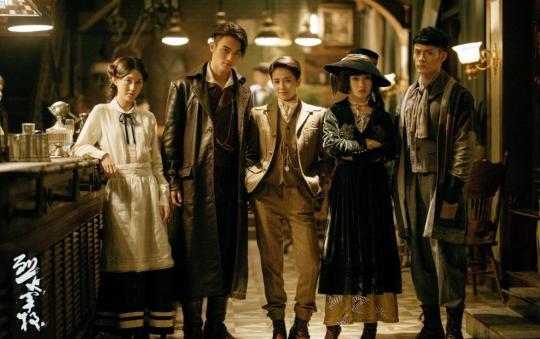
The worldbuilding was really immersive thanks to the costumes, colour grading, OST, and set designs.
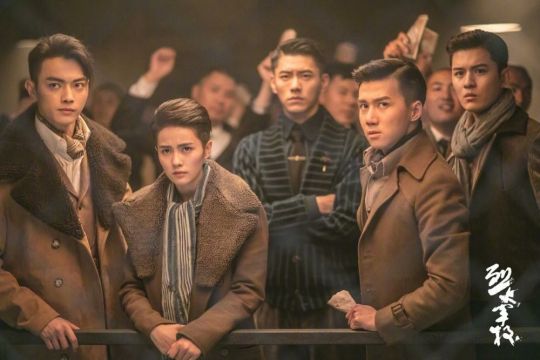
Look at the power stances of this ensemble cast. They’re unstoppable.
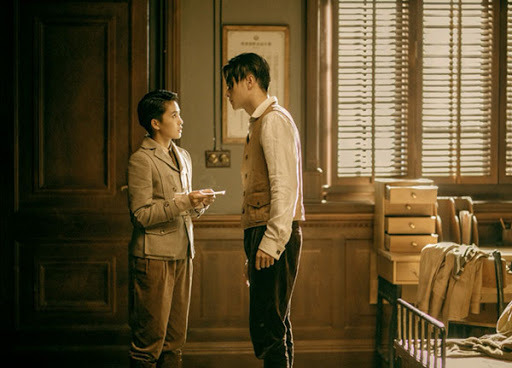
I can’t get over these two. Such a different dynamic from The Legends, but still so much chemistry.
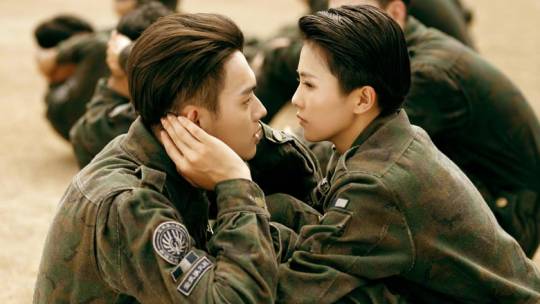
And deleted scenes though!! I don’t remember this sit-up scene in the drama.
67 notes
·
View notes
Text
An analysis of Iori and his character arc

Iori has a particularly interesting position in 02′s narrative (and, even more widely so, in perhaps all of both Adventure and 02) in that his base profile is rather unusual-looking even from the get-go -- the youngest child in both groups, yet with a (seemingly) mature demeanor that surpasses even his seniors. On top of that, Iori ends up having a very deep relation to 02′s themes and plot itself in a way that isn’t initially apparent, but actually makes him a very vital centerpiece of 02′s story.

Before we get into Iori’s role in 02′s actual plot, it needs to be established that a very, very large amount of Iori’s character is heavily shaped by his family background and upbringing. Prior to the start of the series, the Hida family had a large void in it, with Iori’s father Hiroki having been killed in the line of duty. Being a mere five-year-old child who had lost his father barely into actually being sentient and basically had to live the following three years going off hearsay on what he was actually like, Iori ends up raised by his mother Fumiko and his paternal grandfather Chikara.
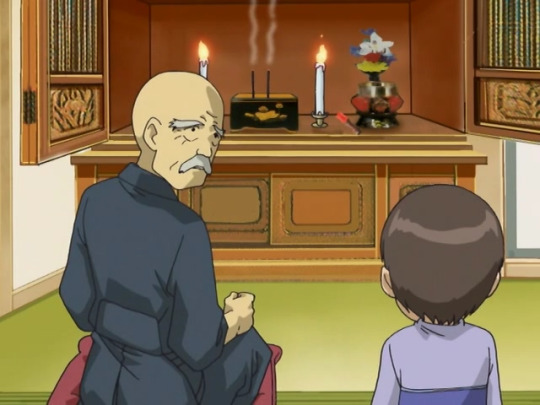

While not in exactly the same way as the Takenouchi family (which is literally working in cultural preservation and study), the Hida family is very traditionalist Japanese -- Fumiko makes traditional Japanese food and snacks like kanpyoumaki and ohagi, and a lot of attention is given to the butsudan altar in their house where they honor the late Hiroki (also note the tatami flooring). That, combined with Chikara’s naturally strict personality, led to Iori being raised with “very strict manners”, and by a set of very firm guidelines on honor, respect, and the like.
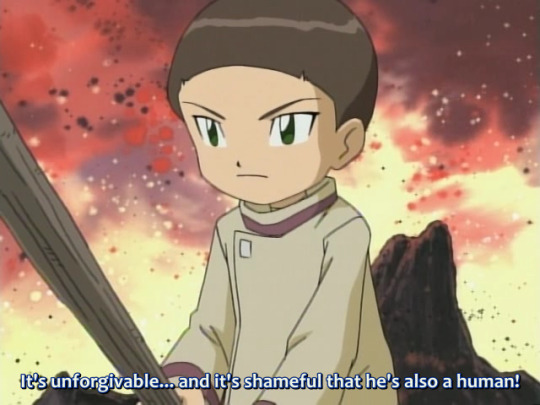
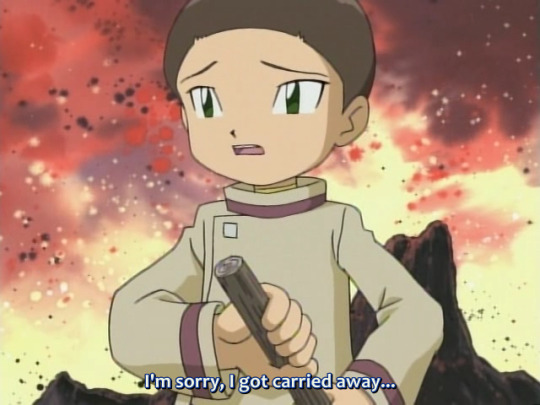
Having been raised into this kind of formality, Iori speaks almost exclusively in polite-form Japanese. This happens to initially make him come off a bit like Koushirou -- likely a deliberate parallel, given the Knowledge connection between the two (being the kind of person who admits that you don’t know everything and wants to know more requires a bit of humility, after all). That said, Iori’s way of doing this has some key differences from Koushirou:
Unlike Koushirou, who was largely polite out of an attempt to keep distance from everyone and thus had a streak of being somewhat non-confrontational, Iori is perfectly willing to say harsh or critical things -- in other words, his way of speaking is formal, but it’s not necessarily polite, and in fact Iori is probably the single most passive-aggressive person in this cast. He has absolutely no qualms about dunking on whatever he feels truly deserves the dunking, and he’ll certainly do it with a lot of grace, but he is very capable of being extremely cold when he wants to be.
Koushirou stuck to formality out of detachment and intimidation, to the point that, as per Adventure episodes 38 and 54, he was compulsively unable to bring himself to speak casually unless he forced himself. Iori, on the other hand, often “slips” -- on top of willingly defaulting to casual form whenever he’s talking to himself or (occasionally) to the Digimon (who are outside Japanese levels of propriety), he also has a tendency to start using casual form whenever he gets particularly emotionally compromised. (While it doesn’t quite come off in the translation, the above screenshots from 02 episode 10 are an example of this, with Iori losing his temper at the Kaiser and slipping into casual form -- and a bit of fun foreshadowing, guess who’s the one to successfully calm him down? Takeru. Remember this for later.) In other words, Iori’s formality is not compulsive, but a conscious thing he tries to maintain as he holds himself to high standards, and is unable to completely uphold during times his emotions get the better of him.
Ultimately, Iori may come off as “mature and composed”, but he’s still an impressionable nine-year-old child, who’s effectively parroting the rules his grandfather instilled in him because he sees it as The One and Only Guide to Living Life. In trying to figure out the right thing to do in any situation, Iori ends up constantly trying to fall back on “this is the right way to do things!” and taking it rather badly whenever things start falling outside of the expected pattern. Despite being the one responsible for Iori’s tightly principled life to begin with, even Chikara himself comments that Iori’s not being flexible enough in his thinking in 02 episode 5 -- because it’s not like he’s expecting Iori to be like this, but Iori is simply having a hard time applying these principles practically when he’s working with the limited range of being a nine-year-old child.

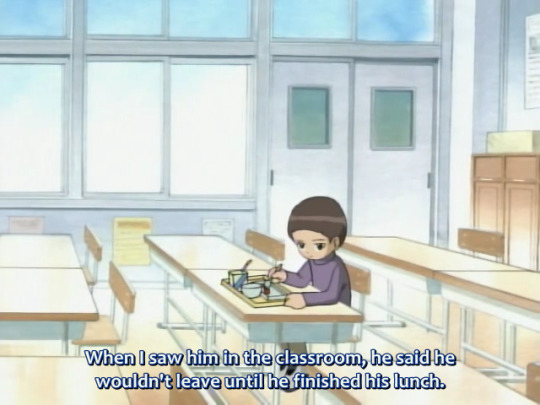
And as much as it may be tempting to see Iori as stoic, watching his expressions and way of emoting throughout the series, he does very much have the full range of emotions and curiosity and even cheer of a nine-year-old child -- it’s that he’s just constantly holding himself back for the sake of being principled and well-mannered. This has the unfortunate side effect that Iori is, as the Animation Chronicle calls it, “clumsy at expressing himself as a child”. Because he’s constantly restraining himself like this, he has a hard time expressing himself or letting himself enjoy things in the way a normal child would.
It also goes a long way in explaining why Iori is never seen hanging out with any other peers his age, and is exclusively depicted in the company of either the rest of the 02 group, or his own family. While part of it is simply because (as per Japanese school procedure) he’s too young to be formally enrolled in any clubs, 02 episode 3 goes out of its way to show Iori being left alone in the classroom with only a teacher stuck supervising him, as he tries to force himself to finish his lunch due to his stubborn adherence to principle (even though he seems to hate tomatoes). In other words, it’s heavily implied that Iori’s own behavior ended up isolating him from his peers. Considering that the 02 group is generally made up of kids who are socially displaced in some way, it naturally follows that, despite being significantly older than him, they end up welcoming him into their friend circle and treating him as an equal.
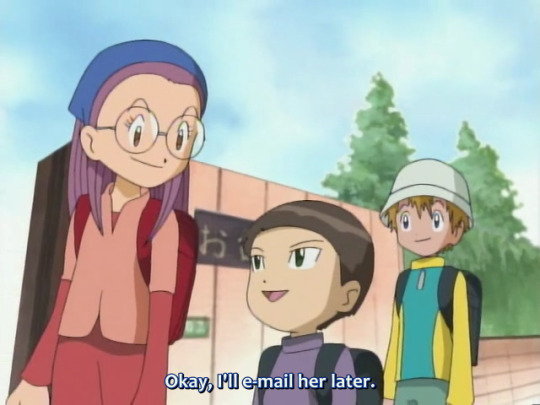
When the series starts, Miyako and Iori seem to have gotten a certain degree of closeness (with Iori as one of the only people Miyako drops honorifics on). It stands to reason that Miyako, being open-minded towards people and rather aggressively friendly, would be willing to befriend her neighbor despite the three-year age gap between them, and so they already seem to have developed a rapport where Miyako’s willing to come over to his place to help work on the Hida family electronics in exchange for food.

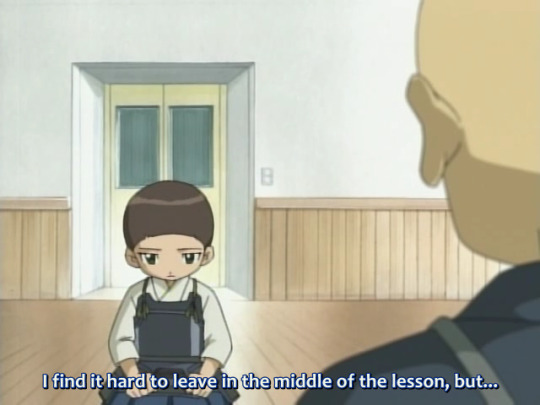
So, you know, this and that happens, Iori becomes a Chosen Child, and this is the start of where Iori’s “principles” start coming into conflict with each other. The nature of the Digital World crisis is a no-brainer -- the Kaiser is doing terrible things, and Iori’s just been given the tools to do something about it, and so for him, upholding his principles to do the right thing means proactively doing something about it. But getting involved in this territory war will mean “fighting and hurting other people” (bad) and “hiding things from his family and sacrificing obligations to them” (also bad). Chikara advises him in 02 episode 5 that he still needs to be the one to decide what he wants and needs to do at any given moment, but it’s clear that this is still a new concept for Iori to swallow.
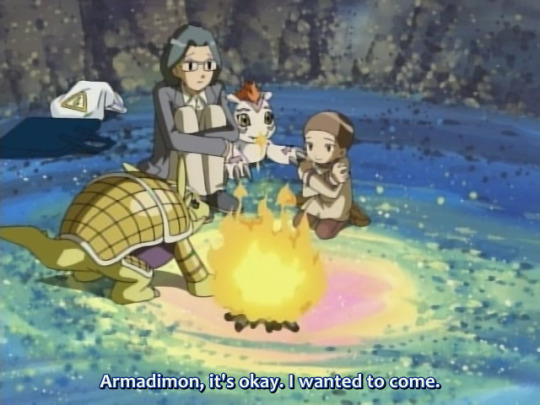
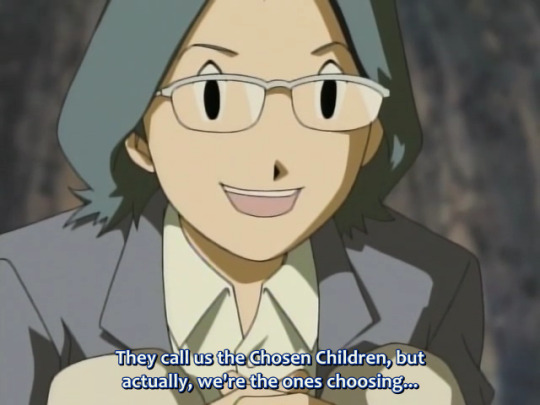
It’s also important that 02 episode 5 is also the episode that introduces Jou, who very much understood the dissonance between “adhering to principles in spite of how practical that may not actually be”, which means the two of them end up bonding over...ditching real-life obligations to come to the Digital World. This bonding happens despite the fact that they have the largest age gap out of any two given kids out of the Adventure and 02 group (Jou is 15, and Iori 9) -- and yet, they’re able to bond over being like-minded like this. And while they come from different contexts, there’s also a parallel drawn between the two on “the importance of personal choice” -- because back in Adventure, Jou’s story involved channeling his desire to help others in a way different from his usual expected path as a doctor or as a Chosen Child, and, likewise, it will be up to Iori to find his own way towards what he thinks is right.


Iori’s “adherence to principles” also needs to be distinguished from Jou’s in that Jou was someone more likely to be stuck to “practical” rules (one might call him Lawful) such as waiting for adults to help them with things, or what to put on eggs. Iori, on the other hand, has self-enforced rules that are far more ideological -- he doesn’t actually care that much about institutionally-enforced rules (note how he has absolutely no issue with sneaking into school with his friends in 02 episode 6) as much as he enforces a moral code on himself about “the right thing to do”. For instance, that he has to show his respect to Jou by formally finishing his introduction, even if it’s clear they know each other by now already.
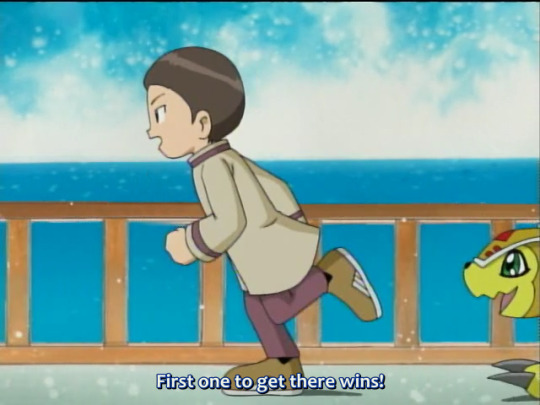



But, again, it bears repeating: Iori is a nine-year-old child. The rest of the kids respect him enough to not treat him like a younger child -- other than a brief moment of emotional compromise that Daisuke quickly apologized for, the group is never really depicted as paying particular mind or care to the fact that Iori is so much younger than them, and for the most part treat him like an equal. But Iori himself is conscious of this -- after all, it’s why he’s constantly speaking politely to everyone all of the time, but 02 episode 16 also implies he’s very self-conscious about this. The plot of the episode kicks off when Iori momentarily gets caught up in his excitement about potentially getting a new Digimental, and, once things start going south, he starts blaming himself for causing all of this and lashing out at the others for (at least, in his mind) singling him out to be the one to escape on the grounds of being the youngest. After all is said and done with the incident, Submarimon lets Iori have a moment of something Iori really does need: a bit of a chance to actually get to enjoy himself as a young child instead of restraining himself so much.

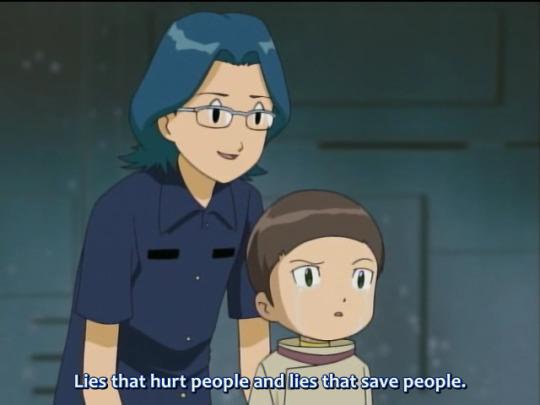
Speaking of 02 episode 16, this is also where we first get to see how the pressure of maintaining Iori’s moral code starts to emotionally tear at him. It’s the first time we see Iori lose his composure this much. To everyone else here (and, perhaps, the audience, to some degree), Iori’s making a mountain out of a molehill -- he’s calling himself an unworthy person for telling a lie that even Jou himself clearly didn’t mind. But remember, Iori is someone who’s still learning a lot about how the world works at such a young age and is inclined by default to fall back on whatever his grandfather’s told him (to a point that even said grandfather considers to be overdoing it). Right now, Iori has basically built his entire view of morality based on this kind of thing, so putting a dent on it is like encouraging a slippery slope of potentially falling into moral depravity.
The reason why I say Iori’s character arc has a lot to do with Adventure and 02’s storytelling itself is that it’s a surprisingly pragmatic series when it comes down to it -- “it’s okay to lie, sometimes” is not exactly the kind of moral you’d expect out of your average kids’ show, but, perhaps a bit unusually, this series prefers to skip all of the preachiness and focus on pragmatics. (After all, back in Adventure, a lot of the final arc revolved around the question of “is fighting the right thing to do when there might be casualties?”, with the probably-kind-of-uncomfortable-but-frankly-very-practical answer of “it certainly beats having more casualties that would happen if you sat around and did nothing.”) Iori’s character arc is, effectively, this in a nutshell -- what’s the “right” thing to do when following principles alone doesn’t seem to be doing it? In the end, both Adventure and 02 are big on this -- preachy words and moralistic principles mean nothing in the face of striving to practically minimize damage and help others.
And so, Jou -- who himself grappled quite a bit with the dissonance between principles and pragmatism back in Adventure -- is the one to successfully reframe it in a way that Iori understands: most of all, Iori doesn’t want to see people get hurt, and whether “lying” or “not lying” is the right thing to do is not as relevant as “whether people are getting hurt”. Iori not lying would have caused a great deal more of hurt than lying, and it’s through understanding this kind of principle that Iori accepts that he still has a long way to go in terms of exercising his duty to others. The secondary Digimental arcs have a heavy theme of “acknowledging your deficiencies and resolving to improve”, and in the case of Iori and the Digimental of (this thing has been translated half a dozen ways, but, effectively, honoring your obligations to others), it involves his first major moment of coming to terms with the idea that the principles on paper he’s been stubbornly following aren’t going to do it by themselves.

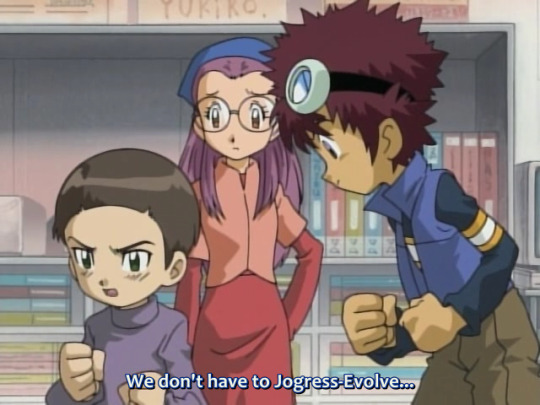
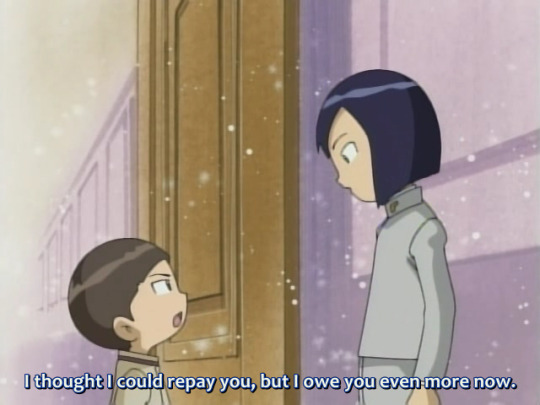
Once the Kaiser arc concludes and the group is posed with the question on how to handle Ichijouji Ken, Iori’s reaction to him is the most infamously extreme: Ken is a Bad Person who is completely beyond forgiveness, and Iori wants nothing to do with him. It probably needs to be made clear that Iori’s stance on not wanting to forgive Ken is not inherently unreasonable. Ken really did some awful, horrible things in the first half of the series, and it is completely within Iori’s rights to decide that he doesn’t want to forgive or like Ken thereafter.
The part where Iori’s behavior starts posing issues is not the part about whether he likes Ken or not, but rather that Iori gets so hung up on that lack of forgiveness that he becomes very bad at observing the practical reality in front of him. Or, in other words, Iori gets so fixated on the principle of what happened in the past that he’s unable to make good judgment calls on what should happen going forward. It is abundantly clear to everyone by (at the latest) 02 episode 26 that Ken is not going to easily lapse back into his old ways and would like to make an effort to repair the damage he caused; regardless of whether they like him or not, it’s in their best interest to cooperate with him and let him help out (and even keep an eye on him to make sure bad things don’t happen again!), especially when the factor of Jogress comes into play and turns out to be a very valuable asset in the fight ahead. But Iori has a a rather squeamish, petty response when he tries to claim that they shouldn’t need Jogress (in the midst of everyone else being excited about the possibilities it poses, even without Ken in the equation) in 02 episode 28, and even when he does go along with everyone working with Ken in 02 episodes 28-29 during the Giga House Incident, he approaches it like he and Ken are bartering favors and that he’ll have to “repay” Ken before he can properly return to pigeonholing Ken as an Unequivocally Bad Person.

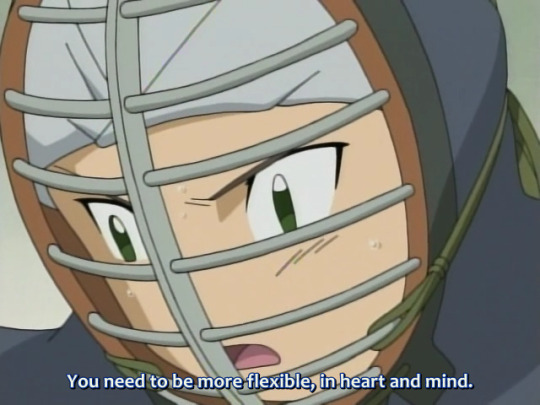
And so the issue here is: Iori being so determined to fixate on trying to stuff Ken into a neat box of a Bad Person isn’t good for himself, either, because it basically means he’s going out of his way to run pointless mental loops and maintain the feeling of stewing in a grudge against him, even when it’s helping absolutely nobody. Note the metaphor drawn when Iori practices kendo with Chikara in 02 episode 24 -- he keeps doing the same motion over and over again despite the fact it’s clearly not going anywhere, and Chikara has to warn him that doing nothing but aim for the head isn’t how you’re supposed to do it. Right now, Iori is having a hard time parsing things in ways besides shoving things in neat boxes of black-and-white morality, and this lack of flexibility is severely restricting his ability to be productive.


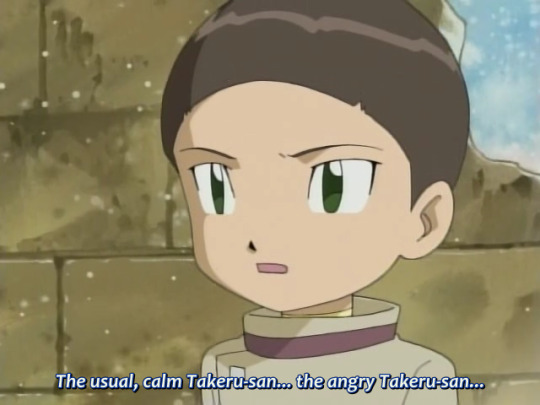
What starts to really cause Iori to make a major shift in his thinking process is none other than his connection with Takeru, a subplot that had already started kicking off all the way back in 02 episode 19, when Iori witnesses Takeru suddenly taking a violent shift in mood against the Kaiser to the point it scares him. Iori, of course, considers Takeru to be a “good" and “kind person”, but someone like that should (in his mind) logically not be making sudden, violent outbursts like that -- and especially once he starts advocating for BlackWarGreymon to potentially be killed if it comes down to it, going very against Iori’s fundamental principle that killing anything that’s sentient is unforgivably immoral.
This “contradiction” is what leads Iori to realize that he needs to do much more if he wants to understand Takeru properly, and it’s also the start of how Iori grows into the trait of his first Digimental, “Knowledge” -- or, more specifically (as defined by Koushirou in Adventure episode 24 and 02 episode 2), “curiosity and a drive to know more”. In the case of Iori, this manifests in “I want to know more about other people.” It’s Iori effectively understanding that his very limited view of the world and how people work isn’t sufficient in itself, and this concept becomes the crux of his character arc for the rest of the series.
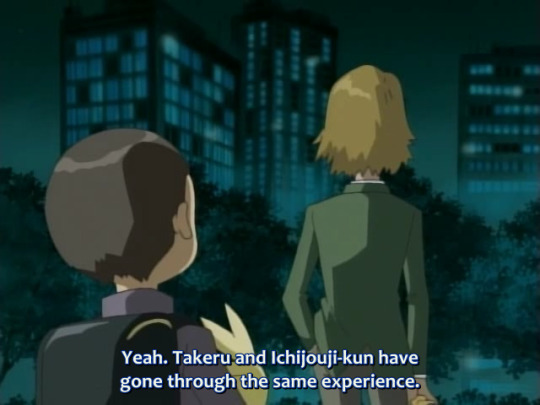
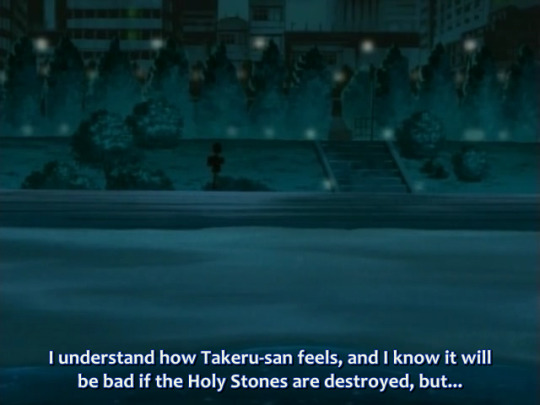
After tussling around and getting increasingly confused about Takeru’s seemingly paradoxical behavior, Iori finally goes directly to Yamato to consult him about it in 02 episode 35, and Yamato explains the backstory behind Takeru’s trauma from losing Angemon back in Adventure episode 13, as well as a reminder that as much as it may have been his own fault, Ken technically went through some pretty similar trauma, and everything that’s happened since his fall from being the Kaiser hasn’t exactly been sunshine and roses for him either. Iori reflects on this as he goes home, with the important statement attached: he understands Takeru’s feelings. He’s now able to understand why Takeru acts the way he does, not on the grounds of principles of what’s right or wrong, but based on the fact that Takeru’s simply a very messy human being who’s not handling his own tendency to suppress his emotions well.
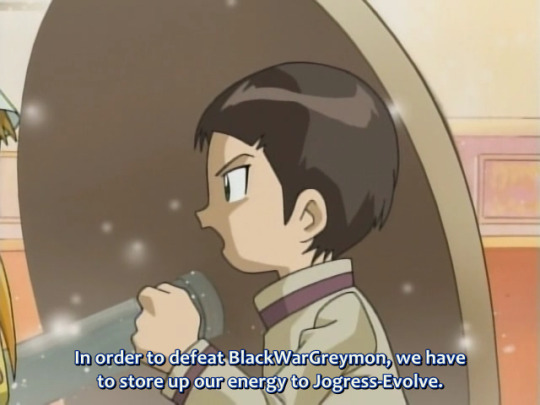
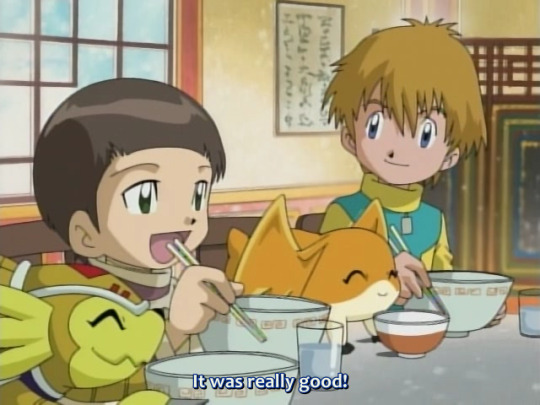

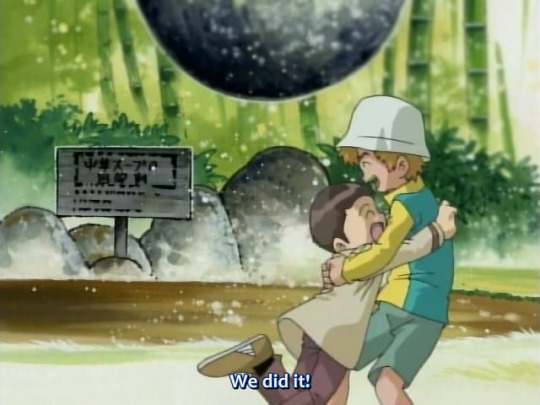
Because Takeru is such a convoluted person, and because Iori’s fundamental issue with approaching things involves unraveling some very deep-seated tendencies in his mentality, the way the two finally connect in order to properly Jogress requires something a lot more convoluted than just happening to clash in a single magical moment like Daisuke and Ken or Miyako and Hikari did. Iori starts off the episode catching himself when he’s about to fall back into “principles over practicality” again -- he starts railing on the others for (in his mind) taking the impending BlackWarGreymon fight too lightly, before Armadimon reminds him that he’s hungry, and Iori realizes -- again -- that he cannot effectively enforce “the right or wrong thing to do” without taking other people’s feelings properly into account. Realizing that this is is a barrier between him and the others, especially Takeru, Iori tries to adjust his thinking pattern and even becomes the one to advocate that everyone get some proper food and rest instead of charging into the fight unprepared.
The meal results in Iori getting yet another rare moment of letting himself truly enjoy something without restraint, and is also followed by Takeru speaking openly to him about their potential Jogress -- openly, honestly, not covering it up, not even with the same light playfulness he would usually put on (including what he had with the very same topic at the beginning of this episode). It is an acknowledgment from Takeru’s own part that he’s been watching what Iori’s doing and also wants to connect, and an open and serious statement from someone who had constantly tried to cover up everything with a smile up until that point, and, with the two reaching an understanding, they finally achieve their Jogress at the end of the episode.
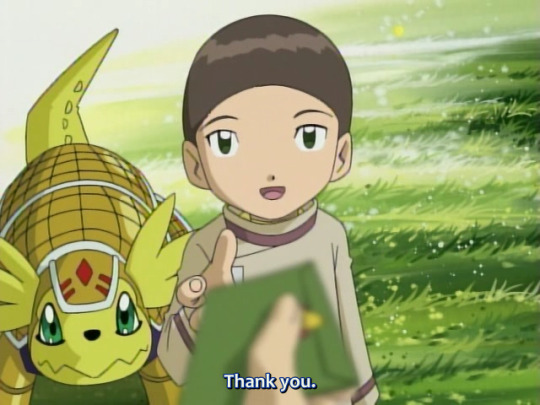
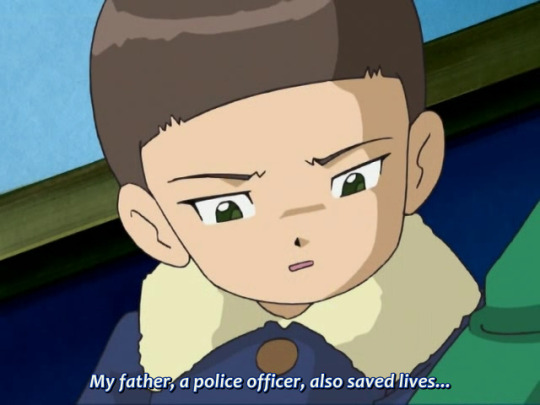
This connection with Takeru, and the understanding that came from it, is what allows Iori to start applying a bit more flexibility towards approaching other situations. 02 episode 38 has him finally accepting Ken’s invitation to his Christmas party, after so many episodes of despising so thoroughly -- because now that he’s taking Ken’s position and feelings into account, he’s able to properly recognize him as someone doing his best to make amends going forward and be friends. Later, in 02 episode 44, despite having originally been the one more staunchly against it on principle, Iori handles the shock of having to kill an enemy with somewhat more grace than Miyako does, because not only had he already started considering the difficulty of fighting an enemy that cannot be reasoned with and wants nothing but wanton destruction (back during the end of 02 episode 29), Takeru is there to remind him that their priority must, first and foremost, be “saving lives” -- like, for instance, the girl in a wheelchair in front of him.
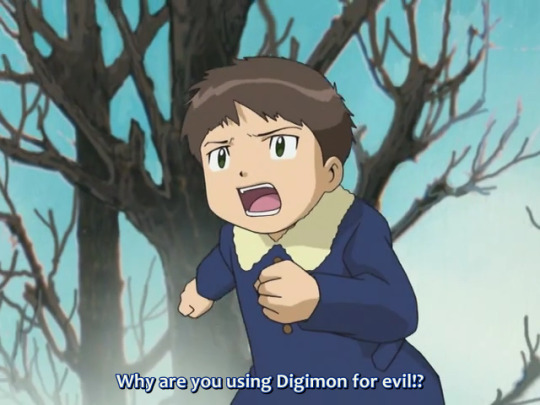
And so, the final episodes of 02 put everything Iori’s learned to the ultimate test, when he learns that the major perpetrator behind it all is none other than a friend of his departed father.
Up until this point, much of Iori’s mentality had been shaped by the rather saintlike image everyone had put up of Hiroki -- it’s almost certain that he must have had his own flaws as a person, but the resistance to speaking ill of the dead, and the generally positive influence he’d had on his friends and family and his untimely death by “protecting someone”, painted him as effectively a perfect, impossible ideal for Iori to strive to. Much of Iori’s justifications for his own behavior had consistently been reliant on “my father said this” or “would my father would have done this?”, such as his reason for forcing down his lunch in 02 episode 3, or using him as a mental model in 02 episode 44. For Iori’s former mentality of “good person” and “bad person”, this is the ultimate contradiction that threatens to rip apart everything Iori had built his own values system on -- that someone so incredible and saintlike and virtuous would be friends with someone so unambiguously doing horrible things like Oikawa. Iori, taking this as an awful emotional blow, parses this with a desperate desire to understand the motive behind why someone would do this, because it’s not enough for him to continue until he does.
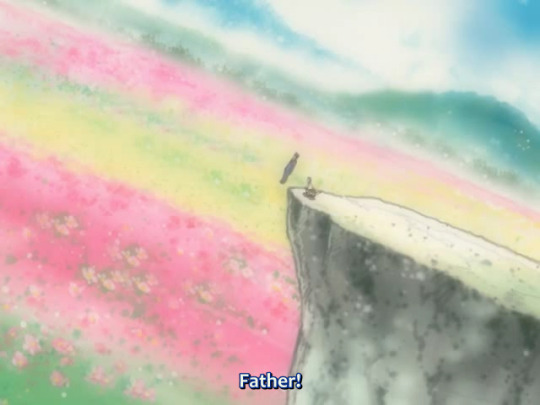
And in 02 episode 49, we see Iori effectively forced to confront the fact that he can’t keep relying on the model of his father anymore as the sole basis for his way of life when, in the end, his father will never return. Iori doesn’t even know him that well; he can’t conjure up an image of him talking, or anything beyond just a flat, serene smile. And when the image of his father finally disappears, Iori almost immediately accepts it, as if he’d known the whole time.
It’s also significant that Iori declares that what he’ll do next is introduce Armadimon to his mother -- because, in the end, Iori is at least now capable of “moving forward”. He can’t get his father back, and the best thing he can do is make use of his existing support group and keep pushing forward with the people he does have in his life -- quite the opposite of Oikawa, who responded to the loss of that exact same person by clutching onto the remnants of the past they shared, and never becoming able to move on.

Hence, 02′s finale ends on none other than Iori, and when you think about it, this is actually a pretty unusual position to be in for someone who’s not the lead protagonist (Daisuke) nor the most prominent focus of the story (Ken)! But it’s a testament to just how important Iori is to this narrative on a thematic level -- all of the struggles about the morality of fighting and the disparity between principles and practicality (which dated all the way back to Adventure), and 02′s prominent theme of coping with loss and regrets and figuring out how to best move on, are all tightly entwined with the character arc of this nine-year-old child. (If you want to take the parallel between the Adventure narrative and Iori even further, Iori and Armadimon sharing the same voice actress is possibly one of the most prominent ways of indicating how a Digimon partner is fundamentally meant to express one’s inner self.)
And especially since Iori is the person who should have been the most vehement about having any kind of sympathy or compassion towards Oikawa -- just remember how determined he was to be cold towards Ken only half a series ago! -- and it leaves a strong impression of the huge, huge journey Iori had gone on through this series. Iori’s arc closes on him understanding the nature of what Oikawa had wanted this whole time, and understanding exactly what it meant for him to make that sacrifice right after finally meeting his partner, and ends the story the most emotionally affected by it -- because, after all, that’s the sort of truly kind person Iori is.
Iori after 02
By the time of Spring 2003, when Iori’s had some time to reflect on it, we learn from Iori that he still does not forgive Oikawa. That in itself is fine; remember, Iori is perfectly within his rights to not do so after all that he’s done. However, again, a distinction must be drawn between whether Iori forgives him, and whether he still considers it to be important to understand the mentality behind why Oikawa did what he did, and to reflect meaningfully on that instead of running himself in circles fixating on a grudge. Again, it’s about going forward with what he knows and has, instead of getting fixated on past deeds -- and with that, Iori resolves to “study”.
In The Door to Summer, we also learn that Iori allegedly has a “girlfriend” -- or, at least, someone Daisuke calls his girlfriend (Daisuke is a bit of an unreliable narrator here, given he’s also totally blown Hikari’s “rejection” of his beach hangout offer up as if it were a full-on total rejection of him completely). It is, perhaps, interesting that Daisuke is capable of getting this impression about Iori’s relationship with someone outside the 02 group, given that he’d been rather isolated from his peers all the way back in 02 episode 3...
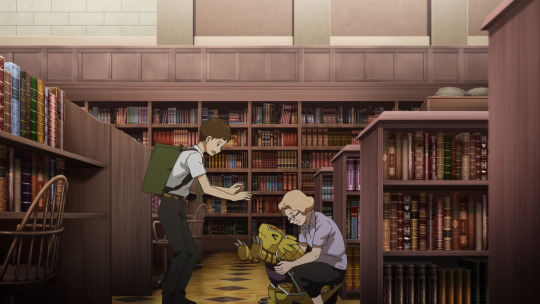
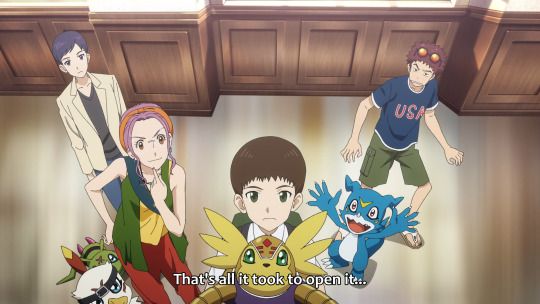
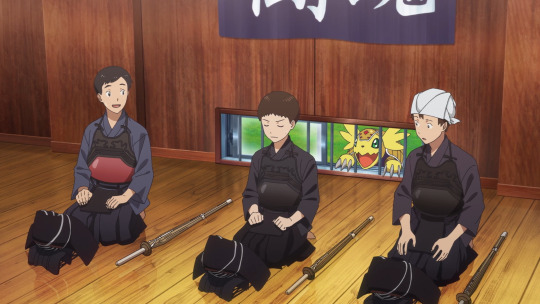
Iori occupies an interesting position in Kizuna, because we only have one point in time where we got to intimately know him, and that was back when he was only nine years old -- and between that and Kizuna, there is a massive eight-year timeskip. He's 17 now, and we don't get any kind of catch-up period in the middle like we did with Takeru and Hikari in 02, and that is a time period where a lot of changes in demeanor could have happened with him compared to all of the others.
At first glance, it seems that he’s gotten much more stoic -- but this is actually something that should reasonably be expected, because now that he’s a teenager, it stands to reason that he would be much better at actually controlling his emotions and not necessarily get overwhelmed as easily. Plus, it’s not like he’s shown to be completely emotionless throughout the movie; he’s just doing a much more graceful job of holding himself back (look carefully at the credits and you can see him sweatdropping at Armadimon barging in on his practice), and moreover you can still see him deliver some pretty direct bluntness about the ramen in New York. Still with formal language, but nevertheless, no flattery is to be had here; Iori will dunk on you if he thinks you deserve it (even if it’s to do with mediocre ramen).
But there are some other interesting observations -- for one, the official website profile states that he’s actually settled on his future career in law at this point, and has made himself extremely busy in order to do so. (On top of that, he at least seems to be on friendly enough terms with his peers at school that they’re happy to greet him on their way out.) The drama CD indicates that Daisuke considers him the busiest out of the entire 02 group -- yet he and Takeru went out of their way to pick him up from school, because he’s that important to them. (Think about it -- how often do you see university students going this far to go retrieve a high school kid to hang out with them?) And likewise, Iori doesn’t even hesitate to state that he’ll make time for them, and throughout the movie he’s conspicuously seen in his school uniform, implying he really is moving things around to make it happen, because they’re that important to him.
He also engages in the single most chaotic action from this group, which is getting Armadimon to break into Menoa’s lab. It’s not that he’d inherently been against this kind of thing before, especially for something important (recall that he’d been happy to sneak into school for Golden Week with the others back during 02 episode 6), but it does beg the question of where and how he got this information that Armadimon could break electric locks. Perhaps he’s become a bit more, ah, pragmatic of a person since 02...
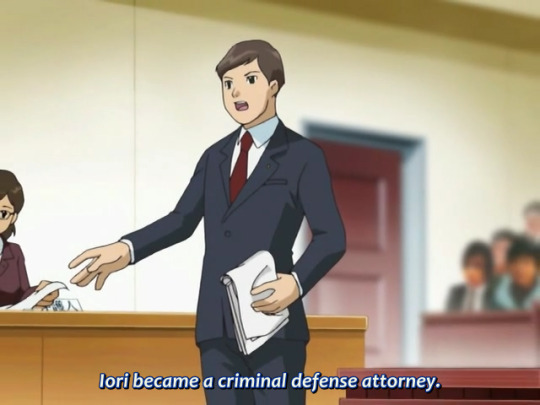
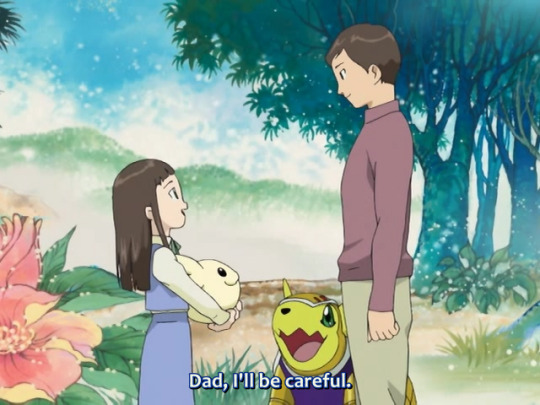
So, in the end, Iori does become an attorney, and specifically a defense attorney (the Japanese law system does draw the distinction). The person who once wanted to stick people he considered to be doing wrong into a “bad people” box and call it a day eventually came to embrace a career that involves understanding people and advocating for their perspective, or at least bargaining for something other than defaulting to the harshest assumption and a solution that allows all of the parties to best productively move forward.
He also has a daughter, who seems to have been raised to be as well-mannered and formal as he was. But, thankfully, he himself is there to help raise and guide her as she grows up.
#digimon#digimon adventure 02#digimon adventure last evolution kizuna#kizuna spoilers#hida iori#iori hida#shihameta
105 notes
·
View notes